Drag artist Stefan Grygelko, aka Heklina, dies

 by Cynthia Laird
by Cynthia Laird
Stefan Grygelko, better known as her drag persona Heklina, has died, her longtime friend Joshua Grannell (Peaches Christ) wrote on Facebook April 3.
The two were in London where they were appearing in the “Mommie Queerest” show there, Grannell wrote, adding that she had gone to pick up Heklina that day.
“I do not know the cause of death yet,” Grannell wrote. “I know this is shocking news and I am beyond stunned, but I wanted to let folks know what has happened. Heklina is not just my best friend, but a beloved icon of our community.”
The news shocked and saddened her friends back in San Francisco, with fellow drag queen Sister Roma writing on their Twitter account that she was “absolutely devastated” to learn of the passing of his friend and collaborator for two-plus decades.
“She is one of the funniest people I’ve ever known. This is a nightmare,” wrote Roma, a member of the drag philanthropy group the Sisters of Perpetual Indulgence, in a tweet.
On Tuesday, Roma posted on Facebook that she’d spoken to Peaches and that an autopsy on Heklina is scheduled for Thursday. Heklina was found dead on the living room floor of the flat she and Peaches shared, Roma wrote.
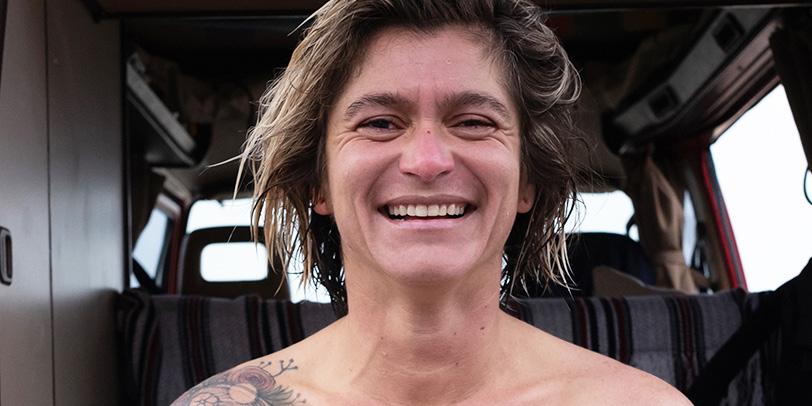

“Peaches immediately called for emergency assistance and is pleased to report that everyone who responded and everyone she has been working with in London has been completely professional and supportive,” Roma added.
Oasis, the LGBTQ nightclub in which Heklina was once a part owner, expressed its sadness.


See page 12 >>
In Sacramento, LGBTQ bills largely focus on youth, health issues
 by Matthew S. Bajko
by Matthew S. Bajko
Issues related to health and transgender individuals, particularly youth, are the main focus of the LGBTQ bills making their way through the legislative process in Sacramento this year. A flurry of hearings about the legislation is expected in the coming weeks, as lawmakers race to meet their first deadline later this month to pass on the various bills with fiscal implications.
Many of the 18 LGBTQ bills the Bay Area Reporter is tracking this legislative session build on LGBTQ laws previously enacted by state lawmakers that focused on issues impacting public schools and foster youth. Several relate to protecting HIV prevention efforts.


Among the marquee LGBTQ bills this year are one’s aimed at repealing state laws. Lawmakers are expected to adopt Assembly Constitutional Amendment 5 by gay Assemblymember Evan Low (D-Cupertino), which would place on the 2024 general election ballot a repeal of Proposition 8 that defines marriage in the California constitution as being between a man and a woman. Voters adopted it in 2008, and though a U.S. Supreme Court ruling in 2013 invalidated it, there is concern that the current conservative majority on the court could issue a new decision once again outlawing same-sex marriage as a federal right.
Another bill generating nationwide attention is state Senate President pro Tempore Toni G. Atkins’ (D-San Diego) Senate Bill 447 called the BRIDGE Act, which stands for Building and Reinforcing Inclusive, Diverse, Gender-Supportive Equality. As the B.A.R. reported last week, it would scrap the state’s ban on using taxpayer money for travel to 23 states that have passed anti-LGBTQ legislation over the past eight years.

In its place would be a marketing program in those states aimed at making their lawmakers and residents rethink their attacks on LGBTQ rights.
Atkins’ bill doesn’t specify how much money would be allotted for the ad campaigns or where the funding would come from to pay for them.
Low, who authored the bill in 2015 that established the travel ban policy, has come out against doing away with it. He did express support for the “general concept” of Atkins’ bill on Twitter last Wednesday following her public rollout of it.

“We shouldn’t completely end California’s state-funded travel ban without having an alter-



See page 4 >>
Peskin issues ultimatum to Another Planet on Castro Theatre
by John Ferrannini
San Francisco Board of Supervisors President Aaron Peskin handed down a powerful ultimatum to Another Planet Entertainment at a committee meeting Monday, saying that the Castro Theatre operator has two weeks to compromise with the community.
“I have to say [APE CEO] Mr. [Gregg] Perloff: you got to walk the walk and talk the talk a little bit faster here,” said Peskin, a straight ally who represents much of downtown on the board. “You can show the community more, sooner, and if you don’t, don’t be surprised. APE walked into this like the 300 pound gorilla and that’s why you haven’t gotten anything finished yet.”
Peskin’s remarks came just before the supervisors’ land use and transportation committee, on which he sits, voted to push consideration of the historic preservation commission’s recommended updated interior landmarking of the movie palace back two weeks.

The 2-0 vote (chair District 7 Supervisor Myrna Melgar had left by then) to push back consideration was made on the advice of gay District 8 Supervisor Rafael Mandelman. Mandelman said he is “hopeful that we can get to the win-win-win I have described elsewhere, but we’re not there yet,” and that two more weeks of negotiations
Scott
could make the difference.
The imbroglio over the theater began in January 2022, when APE – which runs the Outside Lands music festival in Golden Gate Park and the Bill Graham Civic Auditorium downtown – was announced as the new operators of the 101-yearold Castro Theatre.


APE wants to make significant changes to the theater’s interior, including replacing the current fixed seating with a motorized floor that’d make
both raked seating and tiered standing arrangements possible.
Some Castro neighborhood, LGBTQ and film groups – such as the Castro LGBTQ Cultural District and the Castro Theatre Conservancy – formed the Friends of the Castro Theatre Coalition in opposition to the proposed changes, which would allow the theater to sometimes operate as a concert venue.



At issue at Monday’s hearing was whether the supervisors should change the historic preservation commission’s recommended interior landmarking to give further protection to the current seats – protection that could effectively halt APE’s plans. (The exterior of the theater was designated a city landmark in 1977.)
In February, as the B.A.R. previously reported, the San Francisco Historic Preservation Commission approved recommending expanded interior landmarking for the Castro Theatre but stopped short of specifically stating the orchestra seats were part of that. Instead, the commission recommended to the Board of Supervisors that the “character defining features” for the orchestra level include the raked floor, aisles and “presence of seating.” It did recommend landmark status for 1920s seats in the balcony.
Those advocating keeping the orchestra seats
Serving the lesbian, gay, bisexual, transgender, and queer communities since 1971 www.ebar.com Vol. 53 • No. 14 • April 6-12, 2023 No. • May 2021 outwordmagazine.com page 34 page 2 page 25 page 26 page 4 page 15 page 35 Todrick Hall: Returning to Oz in Sonoma County SPECIAL ISSUE - CALIFORNIA PRIDE! Expressions on Social Justice LA Pride In-PersonAnnouncesEvents “PRIDE, Pronouns & Progress” Celebrate Pride With Netflix Queer Music for Pride DocumentaryTransgenderDoubleHeader Serving the lesbian,gay,bisexual,transgender,and queer communities since 1971 www.ebar.com Vol. 51 No. 46 November 18-24, 2021 11 Senior housing update Lena Hall ARTS 15 The by John Ferrannini PLGBTQ apartment building next to Mission Dolores Park, was rallying the community against plan to evict entire was with eviction notice. “A process server came to the rally to catch tenants and serve them,”Mooney, 51, told the Bay Area Reporter the following day, saying another tenant was served that “I’ve lost much sleep worrying about it and thinking where might go. I don’t want to leave.I love this city.” YetMooneymighthavetoleave theefforts page Chick-fil-A opens near SFcityline Rick Courtesy the publications B.A.R.joins The Bay Area Reporter, Tagg magazine, and the Washington Blade are three of six LGBTQ publications involved in new collaborative funded by Google. page Assembly race hits Castro Since 1971 by Matthew S.Bajko LongreviledbyLGBTQcommunitymembers, chicken sandwich purveyor Chick- fil-A is opening its newest Bay Area loca- tion mere minutes away from San Francisco’s city line. Perched above Interstate 280 in Daly City, the chain’s distinctive red signage hard to miss by drivers headed San Francisco In- ternational Airport, Silicon Valley, or San Mateo doorsTheChick-fil-ASerramonteCenteropensits November Serramonte Center CallanBoulevardoutsideof theshoppingmall. It is across the parking lot from the entrance to Macy’s brings number Chick-fil-A locations the Bay Area to 21, according the company,as another East Bay location also opensSusannaThursday. the mother of three children with her husband, Philip, is the local operator new Peninsula two-minute drive outside Francisco. In emailed statement to BayArea Reporter, invited Tenants fight ‘devastating’ Ellis Act evictions Larry Kuester, left, Lynn Nielsen, and Paul Mooney, all residents at 3661 19th Street, talk to supporters outside their home during a November 15 protest about their pending Ellis evictions. Reportflagshousingissuesin Castro,neighboringcommunities REACH CALIFORNIA’S LARGEST LGBTQ AUDIENCE. CALL 415-829-8937 02 07 Trans bodysurfer in film Easter with the Sisters Filmfest Faves ARTS 15 15 The
See page 12 >>
A San Francisco Board of Supervisors committee continued its discussion on landmarking the interior of the Castro Theatre for two weeks.
Wazlowski
Assemblymember Evan Low Tia Gemmell
Heklina performed at her final show at Oasis before moving to Palm Springs – “Mother - The Final” – on February 8, 2020.
Gooch
ARTS
Out judges nominated
Twitter
Senate President pro Tempore Toni Atkins
Newsom names 3 LGBTQ appeal court nominees
by Matthew S. Bajko
Governor Gavin Newsom has nominated two gay men to serve on the state’s appellate courts and moved to elevate a lesbian appeal court justice to preside over her bench. Should they be confirmed as expected, it would bring the number of known LGBTQ appellate justices in the state to seven, two of whom are now serving in presiding justice positions.
In 2021, Newsom had tapped Laurie M. Earl for a vacancy on the Third District Court of Appeal. The former Sacramento County Superior Court judge was confirmed in January 2022 to become her appellate court’s first LGBTQ member.
Now Newsom has nominated Earl to serve as its presiding justice. She would succeed retired presiding justice Vance W. Raye if confirmed later this spring.
Since 2018 gay San Francisco resident James M. Humes has been the administrative presiding justice of

the First Appellate District. In 2014, Humes had become the presiding justice of the First District Court of Appeal’s Division One just two years after becoming the state’s first out member of an appellate court.
Last November, lesbian San Francisco resident Therese Stewart won confirmation to become presiding justice of the First District Court of Appeal’s Division Two. In 2014, Stewart became the first out female appellate court justice in the state.
Also on March 30, Newsom nominated his deputy judicial appointments secretary, Gonzalo Martinez, to serve as an associate justice of the Second District Court of Appeal, Division Seven. If confirmed, the Alameda County resident would fill the vacancy created by the retirement of Justice Laurie D. Zelon.
And Newsom also nominated San Diego Superior Court Judge David Rubin to serve as an associate justice of the Fourth District Court of Appeal, Division One. Rubin would fill
the vacancy created by the retirement of Justice Cynthia G. Aaron if he is confirmed.
Martinez and Rubin would both double out representation in their respective appellate districts. The other current out appeals court justice serves in the Fourth appellate district.
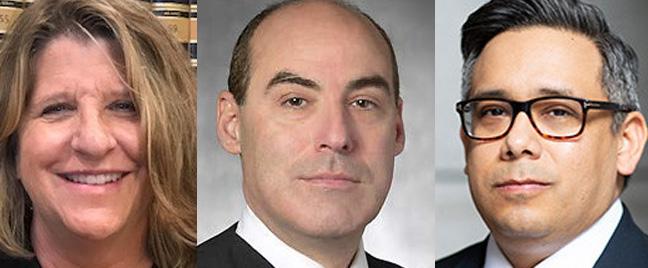
Rubin, who earned his law degree from the University of San Francisco School of Law, has served on his supe-
rior court bench since 2007. Before his judicial appointment he had worked as a deputy district attorney at the San Diego County District Attorney’s Office since 1987.
Martinez, a graduate of Harvard Law School, has worked for Newsom since 2019 after spending two years as a deputy solicitor general in the California Attorney General’s Office. He was also a partner in the Appellate
and Supreme Court Practice Group at Squire Patton Boggs from 2007 to 2017 and in 2019.
Before becoming a judge, Earl had been a senior assistant inspector general at the California Office of Inspector General from 2004 to 2005 and a deputy district attorney at the Sacramento County District Attorney’s Office from 1995 to 2004. She graduated from the Lincoln Law School of Sacramento.
The State Bar’s Commission on Judicial Nominees Evaluation will review all three nominees. They will each stand for confirmation before the Commission on Judicial Appointments, which consists of California Supreme Court Chief Justice Patricia Guerrero, Attorney General Rob Bonta and the senior presiding justice of their respective appellate court. Their confirmation hearing dates should be announced in early April. The trio of appeals court nominees would each earn $264,542 if confirmed.t
Berkeley seminary to hold ‘Souls A’Fire’ conference
compiled by Cynthia Laird
The Reverend Dr. Roland Stringfel-
low will be hosting Berkeley’s Pacific School of Religion’s “Souls A’Fire” conference, which takes place virtually April 22-23, focusing on the intersection between the Christian church, queer identity, and the African American perspective.
Stringfellow, a gay man who is senior pastor at Metropolitan Community Church-Detroit, is also the managing director of PSR’s Center for LGBTQ and Gender Studies in Religion for

2023, while the current executive director is on sabbatical, as the Bay Area Reporter previously reported.
In the nation’s current political climate, with anti-trans laws and Florida’s “Don’t Say Gay” law, “a lot of people feel religion is the main enemy of the LGBTQ community,” Stringfellow said.
However, this conference is seeking to “speak to the church and from the church to claim our space and claim our voice,” he said.
This year commemorates the 20th anniversary of the conference, Stringfellow said, and will feature the Rever-
end Terence Mayo, a gay man, and the Reverend Kyndra Frazier, a lesbian, speaking about spiritual trauma. They will be questioned about whether “their ideas are too idealistic and not applicable to the church, or do they stand by their ideas,” said Stringfellow.
One of the questioners, the Reverend Dr. Pamela Lightsey, will deliver this spring’s Boswell lecture Thursday, April 20, at 4 p.m., which is online, where people can register to attend.
Lightsey, a lesbian, will be speaking on “The Big Lie and Its Old Hatred.”
“This lecture focuses on the ways Black queer bodies are used to leverage the aspirations of political candidates, church leaders, and power
elites,” the Souls A’Fire website states. “It will demonstrate the ways the big lie – propaganda – is damaging the gains made during the civil and LGBTQ rights movements. While its primary focus will be the lives of Black queer women, this lecture will spotlight why all persons who believe in freedom and liberation must see this old hatred as a danger to all humanity.”
On April 23, as part of the closing day of Souls A’Fire, Stringfellow will lead a worship service at Glide Memorial Church in San Francisco’s Tenderloin, which people can also watch via Zoom and Facebook Live.
Signing up for the conference is free and people can do so online (http:// soulsafire.org/).
“This is the school’s opportunity to help folks understand the intersection between the church and LGBTQ identity,” Stringfellow said.
Tenderloin Tessie’s Easter dinner
Tenderloin Tessie will have its free Easter dinner Sunday, April 9, from 1 to 4 p.m. at the First Unitarian Church, 1187 Franklin Street (at Geary Boulevard) in San Francisco.
Organizers said that all are welcome, but attendees should bring their ID and proof of COVID vaccination.
Volunteer shifts are available for Easter Sunday: 9 a.m. to noon; noon to 4 p.m.; and 3 to 6 p.m. People must show proof of vaccination and ID to volunteer.
Volunteer shifts are available on Saturday, April 8, from 10:30 a.m. to 3 p.m., and Tuesday, April 11, from 10 a.m. to noon. Both of these are for truck workers, who will help load and unload items, stated Michael Gagne, president of the all-volunteer Tenderloin Tessie board.
To volunteer, call Gagne at (415) 584-3252 (landline, no texting).
Castro Easter block party
The Castro Merchants Association will hold its inaugural Easter Eggstravaganza Block Party Saturday, April 8, from 11 a.m. to 5 p.m. on Noe Street at Market Street.
Of special note is a bonnet contest, with a $500 prize, a news release stated.

Activities for kids will take place from 11 a.m. to 2 p.m. and include free photos with the Easter bunny, a petting zoo and Easter egg hunt, and drag queen storytime.
Activities for all ages round out the afternoon and include drag performances, music, and entertainment. The aforementioned bonnet contest starts at 4 p.m., the release stated.
There will also be an Easter holiday art mart throughout the day, along with other fun surprises, according to the release.
The merchants group noted that it is holding the event on Saturday so as not to compete with the Sisters of Perpetual Indulgence’s Easter event that takes place Sunday, April 9, at Mission Dolores Park.
There also is the “Drag Up! Fight Back!” rally at San Francisco City Hall on April 8, followed by a march to Union Square, as the B.A.R. previously reported.
SF State Central Asian art exhibit
The Associated Students Art Gallery at San Francisco State University has unveiled “Step into Central Asia,” which is now on exhibit through April 14 at the gallery on the terrace level of the Cesar Chavez Student Center on campus, 1650 Holloway Avenue. The gallery is open Monday-Friday from noon to 5 p.m.
According to a news release, the exhibit celebrates Central Asian art and culture from the countries of Kazakhstan, Kyrgyzstan, Uzbekistan, Tajikistan, and Turkmenistan. It features the work of current artists displaying traditional themes in modern form, thus showing how Central Asian artists carry their culture with them in everyday life, the release stated.
The exhibit also includes interactive elements, such as people learning to write their names in Kazakh and making a bag with Central Asian designs.
San Diego mayor to headline
BAYMEC
brunch
Gay San Diego Mayor Todd Gloria will be the keynote speaker at the Bay Area Municipal Elections Committee’s fundraising brunch Sunday, April 16, from 10 a.m. to 1:30 p.m. at the Signia Hotel, 170 South Market Street in San Jose.
BAYMEC is a political action com-
See page 10 >>

2 • Bay area reporter • April 6-12, 2023 t Each of our communities offer a unique place where you
be yourself, live among
and experience new
your
Explore your next
Communit y is
it is all about. Spring Lake Village Santa Rosa, CA 707.579.6964 springlakevillage-sr.org CA LIC. #490107656 COA#352 St. Paul’s Towers Oakland, CA 510.891.8542 stpaulstowers.org CA LIC. #011400627 COA#351 San Francisco Towers San Francisco, CA 415.447.5527 sanfranciscotowers.org CA LIC. #380540292 COA#350 Independent Living • Assisted Living • Memory Care • Skilled Nursing
can
friends
adventures, all while securing
future.
steps for joining today!
what
<< Community News
Justice Laurie Earl, left, Judge David Rubin, and Governor Gavin Newsom’s deputy judicial appointments secretary Gonzalo Martinez were all nominated to state appellate court positions March 30.
Courtesy Governor’s office
The Reverend Dr. Roland Stringfellow
Courtesy Roland Stringfellow
At Gilead, we understand that it’s going to take a combination of both science and social change to help fight the world’s greatest health challenges. Together, we’re working tirelessly to address health inequities by improving access to care in communities with the greatest need.

Explore

GILEAD and the GILEAD logo are trademarks of Gilead Sciences, Inc. © 2023 Gilead Sciences, Inc. All rights reserved. US-UNBC-1423 03/23
Together, we can advance health equity.
our
at GileadHIV.com.
collaborations
East Oakland Youth Development Center & Gilead
Gay man loses bid for Alameda supe as woman picked
by Matthew S. Bajko
Alameda County supervisors opted not to appoint a gay applicant to a vacancy on the board and instead selected one of the three straight women who had sought the appointment after an hourslong special meeting Thursday. It means the East Bay governing body will continue to have no LGBTQ representation on it.
Harris Mojadedi, a member of the Chabot-Las Positas Community College District Board of Trustees, had sought the appointment to the board’s District 2 seat. The elected position became vacant following the death in early February of supervisor Richard Valle, who represented the communities of Hayward, Union City, Newark, and portions of Fremont.
Mojadedi, who lives in Union City, had become the first gay Afghan American to hold an elected public office in the U.S. following his appointment last year to a vacancy on the college board. He was automatically given a full term when no one filed to run against him in last November’s election.
Going into the supervisors’ deliberations on who should be named to Valle’s seat, Mojadedi had been seen as an underdog candidate. Unlike the trio of female applicants, who had secured four votes to advance to the in-
terview stage of the selection process, Harris had received only three votes from the current four supervisors.
While Mojadedi had earned praise for his performance before the board’s March 28 meeting when they interviewed all four of the applicants, the supervisors after three rounds voted unanimously to name Hayward City Councilmember Elisa Márquez to the vacant seat. She will be formally appointed and sworn into office at the board’s April 4 meeting.
Márquez will double female representation on the five-person board and serve alongside District 3 Supervisor Lena Tam, who was elected last November. Once she is seated, there will be four supervisors of color on the county board.

Supervisor Nate Miley, president of the board, had signaled before the vote that he was looking at the gender makeup of the body as a major factor in his decision.
Noting how the county board is one of the most ethnically diverse in the state, Miley said, “also important in my mind, no disrespect to you Harris, I want to support a female.”
In the first round of voting the four supervisors each could cast votes for their top two picks, with the three applicants garnering the most votes advancing. Three picked Márquez as
one of their choices, while two picked Harris and two choose Fremont City Councilmember Teresa Keng.
Márquez then advanced out of the second round of voting with support from three of the supervisors, while Keng joined her with three votes. Harris dropped out from consideration due to only receiving two votes – one from Tam and one from Supervisor David Haubert, the board’s vice president.
In the third vote round Miley, Haubert, and Supervisor Keith Carson all voted for Márquez, while Tam went with Keng. Tam then seconded Haubert’s motion to nominate Márquez for the vacancy, which all four super-
visors voting to support.
In order to serve out the remaining two years of Valle’s term, Márquez will need to run for election on the March 2024 primary ballot. Should she win then she would run for a full four-year term in 2026.
In response to a question posed to the applicants at Tuesday’s board meeting, both Márquez and Ariana Casanova, a political organizer at SEIU Local 1021, said they intend to seek the seat in next year’s election. Márquez also announced in her reply that she was hosting a campaign fundraiser in April on her birthday.
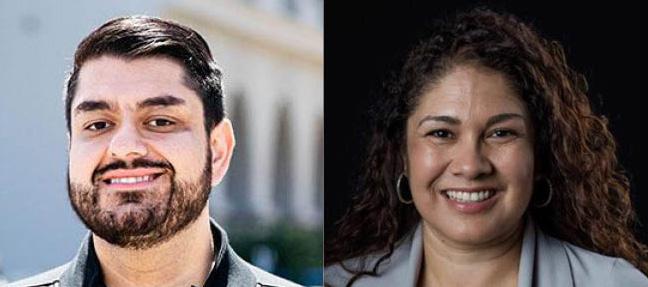
Casanova already has launched a
campaign website, as she noted in her response that she had planned to run for Valle’s seat after his term expired with his blessing. She reportedly recently moved from Oakland to Hayward in order to seek the seat; she fell out of consideration Thursday after only netting one vote from Miley.
As for the other two applicants, Keng told the supervisors her running for the District 2 seat “is a possibility.” She lost her bid for a state legislative seat last year.
Mojadedi told the supervisors that it was “too early for me to determine” if an electoral bid for the board seat next year made sense for him.
Last year, lesbian at-large Oakland City Councilmember Rebecca Kaplan lost to Tam for the open District 3 seat that includes the cities of Alameda, San Leandro, a portion of Oakland, and the unincorporated communities of San Lorenzo, Hayward Acres, and a portion of Ashland. They had sought the supervisor seat following the death in late 2021 of longtime supervisor Wilma Chan, who was struck by a driver while walking her dog in Alameda.
The supervisors had appointed Chan’s former aide, Dave Brown, to serve out the remaining 14 months of her term after he committed to not seeking election to the seat.t
native action in combating discrimination,” wrote Low, who had declined to take a position on SB 447 when asked about it by the B.A.R. last week. “We can’t back down, especially as a record amount of anti-LGBTQ+ legislation is being introduced.”
LGBTQ youth bills
A number of bills would further protect LGBTQ students, especially those who are transgender or gendernonconforming. Under SB 857 by
gay state Senator John Laird (D-Santa Cruz) the state’s Superintendent of Public Instruction would be required to convene a task force on the needs of LGBTQ+ pupil needs by July 1, 2024.
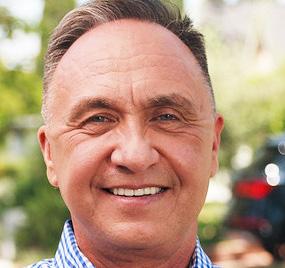
According to the bill, the advisory body would be tasked with assisting in the implementation of supportive policies and initiatives to address LGBTQ+ pupil education. It would be required by January 1, 2026, to report on its findings and recommendations to the Legislature, the superintendent, and the governor.
Shortly after being sworn in last December freshman gay Assembly-
member Rick Chavez Zbur (D-West Hollywood) introduced Assembly Bill 5, the Safe and Supportive Schools Act. It would mandate that teachers and credentialed staff at the state’s 977 public school districts take an online LGBTQ cultural competency training course when it goes live in two years.
The California Department of Education is working with the Los Angeles County Office of Education and the San Joaquin Office of Education on developing the training. Late last year the state agency had told the B.A.R. it intends to debut the online training in conjunction with Pride Month in June 2024.
“LGBTQ+ students face unique challenges, and it’s imperative to implement social and emotional supports that foster healthy development so they can achieve their full potential,” Los Angeles County Superintendent of Schools Debra Duardo, Ph.D., stated in mid-March.
Under SB 760 by state Senator Josh Newman (D-Fullerton), all K-12 schools in California would be required to provide at least one accessible all-gender restroom for students “to use safely and comfortably during school hours.” It is believed to be “firstof-its-kind” legislation, according to LGBTQ advocates.
BelowMarketRate(BMR)ApartmentsAvailableforRent Fitzgeraldat275019th Street,SanFranciscoCA94110
Below Market Rate (BMR) Rental Apartments Available for Rent Fitzgerald at 2750 19th Street, San Francisco CA 94110
1 Studio $1,261 per month;
1Studio$1,261permonth; 5One-Bedrooms$1,436-$3,371permonth; 6Two-Bedrooms$1,597-$4,364permonth; 1Three-Bedrooms$1,754permonth.
5 One-Bedrooms $1,436-$3,371 per month;
6 Two-Bedrooms $1,597-$4,364 per month;
1 Three-Bedrooms $1,754 per month.
Must be income eligible and must not own a home. Households must earn no more than the maximumincome levels below:

Related legislation by Assemblymember Phil Ting (D-San Francisco), AB 783, would require cities to notify all business license applicants that single-user restrooms in any business, place of public accommodation, or government agency must be identified as all-gender restrooms. Under a previous bill that took effect in 2017, the state has required establishments with single-occupancy restrooms to mark them as being gender-neutral.
Mustbeincomeeligibleandmustnotownahome.Householdsmustearnnomorethanthe maximum incomelevelsbelow:
Other bills aim to protect the privacy of transgender youth in California. AB 223 by gay Assemblymember Chris Ward (D-San Diego) would require the courts to seal any petition for a change of gender or sex identifier filed by a minor.
And AB 957 by Assemblymember Lori D. Wilson (D-Suisun City), dubbed the TGI (Transgender, GenderDiverse, and Intersex) Youth Empowerment Act, would allow courts to consider a parent’s affirmation of their child’s gender identity when making decisions about visitation and custody. The bill would also require courts to strongly consider that affirming a child’s gender identity is in the best interest of the child when one parent does not consent to a minor’s legal name change to conform with the minor’s gender identity.
recently reported, the legislation would require that the state’s Department of Social Services specifically considers the needs of LGBTQ youth, who account for a third of foster youth, when doing at-home assessments. It also would specify that conduct that risks the health and safety of LGBTQ youth is a valid reason to deny a family the right to host a foster youth.

Applications must be received by 5pm on 4/18/2023
Apply online through DAHLIA, the SF Housing Portal at housing.sfgov.org. Contact a housing counselor for assistance with your application: housing.sfgov.org/get-assistance.
Applicationsmustbereceivedby5pmon3/1 4/2023.ApplyonlinethroughDAHLIA,theSFHousing Portalat housing.sfgov.org.Contactahousingcounselorforassistancewithyourapplication: housing.sfgov.org/get-assistance.PleasecontacttheFitzgeraldleasingteamformoreinformationat (415) 439-0705 or FitzgeraldBMR@gmail.com
Please contact the Fitzgerald leasing team for more information at (415) 439-0705 or FitzgeraldBMR@gmail.com
UnitsavailablethroughtheSanFranciscoMayor’sOfficeofHousingandCommunityDevelopment andaresubjecttomonitoringandotherrestrictions.Visitwww.sfmohcd.orgforhousingpreferences andprograminformation.
Units available through the San Francisco Mayor’s Office of Housing and Community Development and are subject to monitoring and other restrictions. Visit www.sfmohcd.org for housing preferences and program information.
“Family courts are required to consider a variety of factors when determining the best interest of the child for the purposes of custody and visitation, including the health, safety and welfare of the child, any history of abuse, and history of substance abuse. The TGI Youth Empowerment Act provides California the opportunity to take one step closer to building a safer, more dignified, and equitable world for TGI youth and their families,” stated Wilson, who has an adult transgender son.
LGBTQ foster youth are the focus of SB 407 by gay state Senator Scott Wiener (D-San Francisco). As the B.A.R.
Several other bills relate to gender identity issues. SB 372 by lesbian state Senator Caroline Menjivar (D-San Fernando Valley) would ensure that the public records kept by the state’s Department of Consumer Affairs don’t use the deadnames or disclose the home addresses of licensed mental health professionals.
Meanwhile, AB 1163 by Assemblymember Luz Rivas (D-Arleta) would require various state agencies and departments to revise their public-use forms, by January 1, 2025, to be more inclusive of individuals who identify as transgender, gender nonconforming, or intersex. It would also require the impacted agencies and departments to collect data pertaining to the specific needs of the transgender, gender-nonconforming, or intersex community, including, but not limited to, information relating to
4 • Bay area reporter • April 6-12, 2023 t
SENTRAL-Fitzgerald_BAR-033023+040623.indd 1 3/15/23 11:32 AM
<< Community News
Gay college board member Harris Mojadedi, left, was not appointed to the vacancy on the Alameda County Board of Supervisors as Hayward City Councilmember Elisa Márquez was selected to replace late supervisor Richard Valle.
<< LGBTQ bills From page 1 See page 6 >>
Mojadedi, Irene Yi; Márquez, Facebook
Assemblymember Rick Zbur Courtesy Rick Zbur
State Senator Caroline Menjivar Courtesy Caroline Menjivar

LGBTQs take issue with report on trans prisoners
by John Ferrannini
While a state commissioned report found progress with the implementation of a law governing the placement of transgender people in California’s prison system, LGBTQ and civil rights groups continue to contend that the needs of transgender incarcerated people are not being met. Gay state Senator Scott Wiener (DSan Francisco) also expressed some disappointment with the report’s recommendations.
The prison reform advocates also faulted the state prison agency for its slow pace of granting transgender incarcerated individuals’ requests to be housed in gender-segregated correctional facilities that match their gender. Fewer than 50 such requests have been granted since 2021.
As the Bay Area Reporter has extensively reported, the law requires that the California Department of Corrections and Rehabilitation house transgender people at correctional facilities based on their preference, whether that be by their gender identity or sex assigned at birth.
It also requires CDCR to record each incarcerated individual’s self-reported gender identity, gender pronouns, and honorifics. All CDCR staff, contractors, and volunteers must consistently use the gender pronouns and honorifics that the individual has requested in all communications with or regarding them, according to the law.
The Moss Group, a criminal justice consulting firm, did not respond to requests for comment by press time.
CDCR referred only to a statement by Connie Gipson, the director of CDCR’s division of adult institutions, released with the publication of the report by the state agency on March 2.
“We’re appreciative of the in-depth assessment of our implementation of


From page 4
medical care, mental health disparities, and population size.
Following up on his bill that established a state fund to pay for trans health care services, Assemblymember Miguel Santiago (D-Los Angeles) is now seeking to create a similar one to assist formerly incarcerated trans and gender-nonconforming individuals. His AB 1487 would establish the Transgender, Gender Variant, and Intersex Wellness Reentry Fund, which upon appropriation by the Legislature would provide grants for reentry programming “specifically to support transgender, gender variant, and intersex people who have experienced carceral systems.”
Bills protect LGBTQ health care
With lawmakers in other states re-
SB 132 and the recognition of our efforts to improve the experiences of incarcerated transgender, non-binary and intersex people,” Gibson stated.
The CDCR told the B.A.R. that as of March 26, “350 people housed in male institutions have requested to be housed in a female institution. Fortyseven were approved for transfer, 21 were denied, [and] 35 changed their minds. The remaining requests are being reviewed.”

Amanda Goad, the Audrey Irmas director of the LGBTQ, Gender and Reproductive Justice Project at the American Civil Liberties Union Southern California, stated to the B.A.R. that the report failed to “recognize the serious harms TGI [transgender, gendernonconforming and intersex] people in custody continue to experience because of the agency’s slow and inconsistent implementation efforts and its reluctance to hold accountable those who continue to discriminate against and harass TGI individuals.”
“Hundreds of TGI individuals have requested transfers to facilities better aligned with their gender identities but, contrary to SB 132’s requirements, have yet to receive either a transfer or an explanation of a specific non-discriminatory management or security concern that warrants denying the request,” Goad stated.
“Meanwhile, the few TGI people who have secured transfers to facilities matching their gender identities are enduring harassment and abuse from fellow incarcerated people and staff, disproportionately harsh discipline, and relegation to administrative segregation for extended periods, among other problems,” Goad added.
According to the Moss Group’s findings in the report, the state agency “developed a thoughtful approach to preparing both staff and incarcerated individuals for a successful transition
stricting access to LGBTQ-supportive health care services, California lawmakers are moving to protect access to, and insurance coverage for, such programs in the Golden State. For example, Atkins is the author of SB 487, which would ensure that a health insurer, or health care service plan, couldn’t penalize a licensed California health care provider who performs gender-affirming care services. (It also protects abortion providers.)
In a similar vein, AB 1432 by Assemblymember Wendy Carrillo (DLos Angeles) would close loopholes in existing law to ensure that health insurance policies provided to Californians by out-of-state employers with out-of-state insurance contracts include coverage for abortion and gender-affirming care. Menjivar’s SB 729 would require health plans to provide coverage for fertility care, including treatment for infertility and in vitro fertilization, and ensure that LGBTQ+ people are not excluded from
in housing assignment processes as well as changes in practice to increase safety and respect in the management of (transgender, nonbinary, and intersex) individuals,” the report stated.
The report praised a number of the CDCR’s measures to implement the law, including having wardens of female institutions chairing Institution Classification Committee hearings (ICCs review gender identity-based housing requests), requiring the presence of the individual requesting transfer at an ICC, staff commitment to honoring people’s pronouns, and a process for incarcerated people to submit a grievance.
The “analysis also included several recommendations related to search preferences, property, reception center processing and orientation, review of gender-based housing and searching requests, unit and bed placements, staffing, training, communications, leadership and culture, and research and data,” the Moss Group stated. “CDCR has begun implementing these recommendations and will continue to refine its SB 132 process this year.”
Mixed reactions
Bill author Wiener was pleased that “the report’s findings are generally very positive, reflective of the feedback provided by impacted people who are incarcerated,” he told the B.A.R.
such coverage.
Assemblymember Buffy Wicks (DOakland) has authored two bills this session to further protect paid leave provisions for LGBTQ people and others who need to care for their chosen family members, i.e. people they are not related to but have close bonds with and care for when they are sick.
As the B.A.R. reported last week, her AB 518 would give workers the right to receive Paid Family Leave wage replacement benefits while on leave to assist their chosen family.
Her AB 524 would make it unlawful for employers to refuse to hire, fire, demote, or take other adverse employment action against workers because of their responsibilities to their biological or chosen family members. Since January California family leave provisions cover workers with chosen family due to the enactment of Wicks’ AB 1041 that was passed by lawmakers last year.
Two bills aim to ensure people in
“CDCR’s commitment to incorporating the report’s recommendations into the Institution Classification Committee process, as well as honoring the preferred pronouns of transgender incarcerated people, is laudable,” he continued.
Wiener had mixed thoughts, though.
“Some of the report’s recommendations are cause for concern – particularly the suggestion to remove SB 132’s statutory language designed to protect the immediate safety of trans people who are being threatened while in prison,” he stated.
Wiener was referring to a recommendation on page 4, which states that the part of the statute in which individuals are permitted single cells, a choice of cellmates, and the “ability to remove other individuals from any location, solely based on [their] status as an SB 132 individual” ought to be amended.
“SB 132 was a major and overdue change in the law to improve the safety of trans people in prison,” Wiener stated. “Implementing it successfully will require ongoing dialogue. We must resist hasty changes that would risk compromising the law’s intent and the safety of incarcerated Californians.”
Other responses to the report were more negative. The ACLU’s Goad asserted to the B.A.R. that the report isn’t complete.
“While a few of the report’s conclusions and recommendations appear rooted in fact – such as the observation that trans women are being targeted by abuse of the PREA complaint system – for the most part the Moss Group seems to have relied on information that was neither accurate nor complete and thus reached findings that are also inaccurate and incomplete,” she concluded, referring to the Prison Rape Elimination Act of 2003.
California have access to PrEP in light of recent court decisions that have ruled health insurers don’t need to cover the HIV prevention medicine. Zbur’s AB 1645 would close loopholes and strengthen protections in existing law to ensure that California health insurers continue to provide free and complete coverage for preventive services like PrEP and testing for sexually transmitted infections.
Wiener’s SB 339 would increase the amount of PrEP that pharmacists are authorized to provide without a doctor’s prescription and require health plans to reimburse pharmacists for PrEP services. It builds on his first-inthe-nation legislation passed in 2019 that authorized people to acquire a limited amount of PrEP from a pharmacist without a doctor’s prescription.
The Legislature’s various policy committees have until April 28 to send bills with budgetary implications to the two chambers’ fiscal committees to consider. Those review panels have
Letters >>
Straight actors playing gay
I read Victoria Brownworth’s column on the terrible ways in which the movie industry keeps mistreating gay people and lesbians and disabled people [“‘The Whale’ and the cinematic curse of disabled queerness,” Lavender Tube, March 21]. Right.
I guess I’m not that surprised that she, too, is one of these people that thinks only LGBTQ+ actors should play LGBTQ+ characters. If that’s true – which it is not – then only straight people should play straight characters, etc. Does she believe that too?
Do people like her not know what acting is? Seriously. These actors keep winning awards because they are convincing as someone they are not – gay, lesbian, disabled, etc. Were the producers of “Monster” supposed to cast
Bamby Salcedo, a trans woman who is the president and chief executive officer of the Los Angeles-based TransLatin@ Coalition, told the B.A.R. that the report is “deeply disappointing.”
“CDCR has not come through with what the law says,” Salcedo said. “The greater disappointment in this report is saying things that are not true, because they are not the experience of trans, intersex, incarcerated people.”
The coalition had co-sponsored SB 132.
“They have not built the infrastructure to make this a reality for our people, and the people who did this report did not do a thorough investigation,” Salcedo said. “They are just going on what CDCR is telling them.”
Terri Jay, the program coordinator of re-entry programs with the coalition, told the B.A.R. that there are “ongoing issues of denials of request for housing relocation to best housing that reflects [incarcerated people’s] TGI identity,” and that TGI people requesting hormone replacement therapy are being denied.
“SB 132 is a path for TGI while incarcerated to feel safe when housed as the trust should begin with CDCR staffing/ clinicians and to include trans sensitivity training and/or Trans 101 Education to improve quality for CDCR staffing/ clinicians how to work best with TGI while incarcerated,” Jay stated.
Meanwhile, a federal lawsuit filed by four women incarcerated by the state that seeks to have SB 132 struck down as unconstitutional is still pending in the Eastern District of California. Last May, four trans women filed to intervene in the case of Chandler v. CDCR, as the B.A.R. reported, saying their rights would be violated if the case is decided against CDCR.
The Moss Group report in its entirety is available online at https://bit. ly/3nGgFNz.t
until May 19 to send the bills for a floor vote in their chamber of origins.
The deadline for committees to report non-fiscal bills to floor votes in their house is May 5. Bills need to be voted on by their house of origin before June 3, while the final deadline to send bills to Governor Gavin Newsom to consider is September 14.
“The LGBTQ+ community is facing an onslaught of attacks by far-right extremists across the country with attempts to roll back civil rights that our community has fought tirelessly to achieve,” stated Tony Hoang, executive director of statewide LGBTQ advocacy organization Equality California.
“Here in California, we are standing up against hate and will continue leading the way to ensure LGBTQ+ Californians are protected, healthy, and can build a future that represents their values with a community that accepts and supports them. We are not allowing the ongoing attacks to set us back today – or ever.”t
a cold-blooded murderer instead of Charlize Theron, who probably had no first-hand experience killing men?
What a mess this would become. I can only imagine the casting agencies and production offices when they are in the process of making sure the actor/actress they are about to cast is, indeed LGBTQ. “Handmaid’s Tale” by way of Creative Artists Agency. These people who are at the most extreme left have stopped thinking things through. It’s disturbing. The extreme left continues to embarrass the old-school liberals like myself.
And no, Victoria, Brendan Fraser was not a villain in “The Whale.” He was a victim.
6 • Bay area reporter • April 6-12, 2023 t
<< Community News
The Central California Women’s Facility in Chowchilla
Courtesy ABC30
<< LGBTQ bills
Anthony Rhody San Francisco
Ocean film fest to feature trans bodysurfer
by Marijke Rowland
When two people met in the water near the Manhattan Beach Pier, their shared love of surfing overcame their outward differences and became the basis for a new short documentary about the sport and trans joy.
“Gender Outlaw: A Bodysurfing Story,” the result of two men’s chance meeting on the waves more than two years ago, will be screened Friday, April 14, at the 20th annual International Ocean Film Festival in San Francisco. The showing will be the Bay Area premiere for the 16-minute documentary about Southern California bodysurfer Tyler Wilde.
Wilde, a 38-year-old transgender man who identifies as queer and nonbinary, was bodysurfing when he met commercial filmmaker Peter Williams in the ocean. The 42-year-old straight cisgender male director said he was impressed by how “stoked” Wilde was about the sport, and life in general.

“The common denominator for us was our passion for the ocean, passion for sports and passion for surfing,” Williams said in a recent phone interview. “In the end (the film) is less about gender identity and more about catching waves and being around people who appreciate and are driven by similar things.”
The short documentary introduces Wilde, a member of the Gillis Beach Bodysurfing Association and a physical education teacher of middle and high school students in the Los Angeles area for the past dozen years. The film features plenty of footage of Wilde bodysurfing, a style of surfing done wearing only flippers and without any kind of assistance from a board.
But Wilde said the project is also an important example of trans joy, and the need for the full spectrum of trans and LGBTQ experiences to be shown in the media. With the continued on-
slaught of anti-trans legislation being passed across the country, Wilde said the focus is too often on the troubles and traumas trans people face, and not their lives as a whole.
“I open my social media and ... all I see are all these bills about our health care and livelihoods and attacks and stories of trans people being murdered,” he said, referring to anti-trans laws banning gender-affirming care and other services. “You lose hope. You can’t envision a future that doesn’t include violence or not getting your basic needs met. And that’s no way to live. No one can live in survival or trauma mode. It’s hard to envision a
life without that.”
Wilde, who spoke with the B.A.R. over the phone while on spring break in the Tahoe area, said he was grateful to Williams for allowing him to be an active part of the creative process, and to help evolve the story beyond the original vision for the film.

“(Williams) had this vision of a phoenix rising from the ashes. Like you go through all this trauma and strife, but look at what you’ve overcome. I hate that trope,” Wilde said. “It’s not just about fighting to survive and thrive. It’s not just about the resistance. I wanted to focus on trans joy and make a feel-good movie for trans
people and for everyone.”
The documentary shows Wilde with his girlfriend, Marit, as well as with the largely 60-and-70-something straight white cis male members of the Gillis Beach Bodysurfing Association. Founded in 1964, the group has welcomed Wilde into the club, and he now considers them part of his chosen family.
“We are the oldest body surfing group on Earth, founded in 1964. We’re a great group of friends, we really care about one another, we stand by one another,” said association member John Shearer in the film. “To us, Tyler is just part of our community.”
Shot last year in Southern California, the project was originally planned as an Instagram Reels short, but then one day of filming became nine and Williams said he realized there was a bigger story to tell.
First released last spring, the short film has been selected for about 20 film festivals and has already taken home the 2023 Diversity, Equity and Inclusion Award for its upcoming International Ocean Film Festival appearance. It also won best short documentary at the Berlin Indie Film Festival and was named second overall at the Incluvie short film festival.
Wilde and Williams have used the film to raise money for the TransLatin@ Coalition, a nonprofit organization in Los Angeles that supports transgender, gender-nonconforming, and intersex immigrants. Williams said he was able to send a check for $5,000 to the organization, and they continue to fundraise for the group through the film.
Bamby Salcedo, a trans woman and chief executive officer of the coalition, did not immediately respond to a request for comment.
Wilde and Williams will both be at the San Francisco screening and take part in a filmmaker Q&A that evening.
“I really wanted it to be clear (through the film) that trans people just want to be happy like everyone else,” Wilde said. “Here is one person who was able to find community in probably an unlikely place. And, yes, I’ve overcome things. But it’s really just about a trans person living their life.” t
“Gender Outlaw: A Bodysurfing Story” will screen April 14 at 7 p.m. at the Cowell Theater at the Fort Mason Center in San Francisco for the International Ocean Film Festival. For more information visit intloceanfilmfest.org.
April 6-12, 2023 • Bay area reporter • 7 t Driverless
more More room to stretch out. More time to relax. More space to be you. Our driverless rides give you more freedom, time, and peace of mind. Join the waitlist and be one of the first to experience the magic of a driverless ride. getcruise.com Untitled-8 1 10/19/22 9:14 AM
is
Community News>>
Southern California bodysurfer Tyler Wilde is the subject of “Gender Outlaw: A Bodysurfing Story” that will screen at the International Ocean Film Festival.
Peter Williams/Cross Step Content
Volume 53, Number 14 April 6-12, 2023 www.ebar.com
PUBLISHER
Michael M. Yamashita
Thomas E. Horn, Publisher Emeritus (2013)
Publisher (2003 – 2013)
Bob Ross, Founder (1971 – 2003)
NEWS EDITOR
Cynthia Laird
ARTS & NIGHTLIFE EDITOR
Jim Provenzano
ASSISTANT EDITORS
Matthew S. Bajko • John Ferrannini
CONTRIBUTING WRITERS


Christopher J. Beale • Brian Bromberger
Victoria A. Brownworth • Philip Campbell
Heather Cassell • Michael Flanagan
Jim Gladstone • Liz Highleyman
Brandon Judell • Lisa Keen • Philip Mayard
Laura Moreno • David-Elijah Nahmod
Paul Parish • Tim Pfaff • Jim Piechota
Marijke Rowland • Adam Sandel
Jason Serinus • Gregg Shapiro
Gwendolyn Smith • Charlie Wagner
Ed Walsh • Cornelius Washington • Sura Wood
ART DIRECTION
Max Leger
PRODUCTION/DESIGN
Ernesto Sopprani
PHOTOGRAPHERS
Jane Philomen Cleland • FBFE
Rick Gerharter • Gareth Gooch
Jose Guzman-Colon • Rudy K. Lawidjaja
Georg Lester • Rich Stadtmiller
Christopher Robledo • Fred Rowe
Steven Underhill • Bill Wilson
ILLUSTRATORS & CARTOONISTS
Christine Smith
VICE PRESIDENT OF ADVERTISING
Scott Wazlowski – 415.829.8937
NATIONAL ADVERTISING REPRESENTATIVE
Rivendell Media – 212.242.6863
LEGAL COUNSEL
Paul H. Melbostad, Esq.
Amend, don’t repeal, CA travel ban
Lesbian state Senate President pro Tempore
Toni Atkins (D-San Diego) surprised many last week – including us – when she introduced legislation that would repeal California’s law prohibiting publicly funded travel to states that have anti-LGBTQ laws. This “no-fly” list now has 23 states, including some big ones, like Florida and Texas. But Atkins’ idea to replace the travel ban with a donation-driven (and possibly taxpayer-supported) fund called the Building and Reinforcing Inclusive, Diverse, Gender-Supporting Equality Act, or BRIDGE, seems short on specifics and outcomes. Amending the travel ban law would be more effective. If the travel ban’s intent was to get those states to repeal their anti-LGBTQ laws, it hasn’t worked – as evidenced by the addition of states every year since the ban went into effect in 2017 – and replacing it with what’s essentially a marketing campaign seems prone to being equally ineffective. We don’t see lawmakers in red states suddenly demonstrating a conscience by seeking to undo the anti-LGBTQ laws they’ve authored or governors deciding to veto such legislation. Heck, we don’t even see those leaders acknowledging California for repealing the ban. The country is polarized. This year alone, the American Civil Liberties Union is tracking 430 antiLGBTQ bills promulgated by right-wing politicians, media outlets, and churches.
Rather, Atkins’ Senate Bill 447 seems like it’s designed to offer support to LGBTQ people in those red states by showing public service-type ads that will “help build a bridge of inclusion and acceptance,” as she stated in a news release, while discouraging discrimination. During a press briefing with reporters last week, Atkins was asked several times if Assembly Bill 1887, the travel ban authored by gay Assemblymember Evan Low (D-Cupertino), was a failure. She denied that. “I think 1887 was successful. We saw states like North Carolina and Georgia that had a positive impact. It was effective in what we were trying to do,” she said, referring to the moving of the NCAA men’s basketball tournament games out of the Tar Heel State in 2016, before the law took effect. “I think we sent a message loud and clear.”
Atkins, who said that she voted for AB 1887, also told reporters that she has talked to Low, who, so far at least, doesn’t seem to be on board with jettisoning his own law. “We shouldn’t completely end California’s state-funded travel ban without having an alternative action in combating discrimination,”

Low wrote on Twitter March 29, repeating a similar stance he took with the Bay Area Reporter earlier in the month. “We can’t back down, especially as a record amount of anti-LGBTQ+ legislation is being introduced.” He has a point.
Atkins, who last year campaigned for the successful California Proposition 1, which enshrined the right to abortion into the state constitution, and has long worked on reproductive rights legislation, also offered this: she told reporters that because of the travel ban, the state can pay for transportation for people to come here for an abortion, but “we actually couldn’t legitimately spend money to send them home.” (The state last year set aside $20 million to help people in other states come here for abortions after the U.S. Supreme Court overturned Roe v. Wade, which led many red states to institute immediate restrictions.)
We realize that the travel ban has had unintended consequences, like the abortion funding snafu above. In another example, instructors at state universities and colleges can’t use school funds to travel to states on the nofly list to conduct research on issues affecting LGBTQ people living there. But we don’t see SB 447 as the answer and amending the travel ban law is a preferable option. Lawmakers do this regularly, cleaning up past bills to improve them by carving out exceptions or other measures.
This would be a better route, especially since Governor Gavin Newsom just one day later launched his own Campaign for Democracy political action committee and infused it with a $10 million transfer from his campaign account.
That’s right. Newsom is traveling to many of those red states on the no-fly list and apparently wants to broadcast television commercials and social media messages in the hopes of persuading residents to reject what Newsom calls “authoritarian leaders.” His video rollout included criticisms of Republican leaders “who ban books, criminalize doctors, fire teachers, intimidate librarians, kidnap migrants, target trans kids, stoke racism, and condone antisemitism.” Sounds like the same audience Atkins wants to reach, albeit with her ads focusing more on LGBTQ issues. If both of these campaigns get up and running, red state residents could be bombarded with gauzy messages about how great California is. (Not that there’s anything wrong with that.)
Here’s another idea: instead of spending all of this money to broadcast supportive messages to LGBTQs in red states, California lawmakers and the governor should work harder trying to find the funds for the various LGBTQ bills that have been vetoed because of their high price tags. Last year, as we reported, Newsom vetoed legislation aimed at helping lower-income state residents access treatment for sexually transmitted infections. Senate Bill 1234, the STI Prevention & Treatment Fairness Act, had sought to expand access to services for the prevention and treatment of STIs to income-eligible patients who have confidentiality concerns, including LGBTQ+ patients, through the state’s Family Planning, Access, Care, and Treatment program. While an analysis could not provide a specific dollar figure, the bill was expected to cost in the tens of millions of dollars, including federal funds, and about $9 million from the state’s general fund.
Newsom last year also vetoed a bill that would have instructed the state Department of Social Services to launch a five-year pilot project called the Youth Acceptance Project in counties that volunteered to sign up for it. The state agency would have entered into a contract with the nonprofit Family Builders by Adoption to provide therapeutic-style support and intervention services to LGBTQ+ youth who receive, or are at risk of receiving, child welfare services. This, too, had a significant price tag, Newsom noted.
Many LGBTQ youth and adults in red states are facing prejudice and hostility from their own governments, religious leaders, families, and schools. A few 30-second ads extolling the virtues of California, or LGBTQ leaders telling them they have support, are not going to do much for the day-to-day discrimination they face.


Amend AB 1887.t
Reclaiming the Resurrection
by Jim Mitulski
“After the winter snows, a wind of healing blows and thorns put forth a rose and lilies cheer us.
Life’s everlasting spring has robbed death of its sting.
Bay area reporter

44 Gough Street, Suite 302 San Francisco, CA 94103 415.861.5019 • www.ebar.com
A division of BAR Media, Inc. © 2023
President: Michael M. Yamashita
Director: Scott Wazlowski
News Editor • news@ebar.com
Arts Editor • arts@ebar.com
Out & About listings • jim@ebar.com
Advertising • scott@ebar.com
Letters • letters@ebar.com
Published weekly. Bay Area Reporter reserves the right to edit or reject any advertisement which the publisher believes is in poor taste or which advertises illegal items which might result in legal action against Bay Area Reporter. Ads will not be rejected solely on the basis of politics, philosophy, religion, race, age, or sexual orientation.
Advertising rates available upon request.
Our list of subscribers and advertisers is confidential and is not sold. The sexual orientation of advertisers, photographers, and writers published herein is neither inferred nor implied. We are not responsible for unsolicited manuscripts or artwork.
Henceforth, a cry shall bring our Master near us”
– from «Easter» by John Masefield (1929)
There is nothing like spending two winters in Duluth, Minnesota to make one appreciate the San Francisco Bay Area and all that it has to offer. I recently returned here after serving in an interim position at the largest and most progressive church in Northern Minnesota. I loved the job. The church embodied everything that is hopeful about what a religious institution can do to be a force for liberation in society. And I loved the people and their hospitality. Even their wry sense of humor grew on me over time.
I found real community in the small LGBTQ population that hosted an annual Pride Day on Labor Day weekend. I was active in the NAACP, an especially important organization in the struggle for racial justice. And I was impressed by how committed so many people who live there are to a variety of social justice issues, especially environmental causes. Indigenous Peoples’ Day, the pro-choice rallies, and the Juneteenth celebration in which I participated are just a few of the ways that testify to how a community like Duluth can express itself in intersectional ways. I learned a lot while I was there, from them, and also about myself. I learned that though I had grown up in Michigan I just can’t endure sustained subzero weather and endless snowfall.
When anyone who has ever lived or worked in the Bay Area relocates, they bring a gift, one that we have developed internally as a result of living in this beautiful place where the hard-won level of LGBTQ acceptance changes us. San Francisco queerness is irrepressible. In modeling resistance to oppression, we changed history here. And we survived HIV/AIDS in a way that proved useful when the world faced a new, though slightly different, epidemic in COVID. Our resilience and creativity and even the medical knowledge garnered through the AIDS years are invaluable resources. And the agency we exhibited in facing end-of-life issues is being validated in legislation that gives people far more legal choice when it comes to navigating terminal illness. Now the world is able to receive this knowledge in a way they would not have 40 years ago.
This Easter I invite you to join me in reclaiming
the Resurrection. When I was in Duluth for my first winter I was embarrassed by how much my language and understanding of Easter was tied to conventional concepts of spring. I had always in my preaching made much of how new life and new beginnings were reflected in the natural world at this time of year. But living on the shores of Lake Superior and its five-month winter there is no evidence of spring there at Easter time. It forced me to redefine Easter from a shallow kind of spring festival and to really examine the many ways in which I saw resurrection – life before death as well as life after death. If we can broaden the definitions, we can experience it more fully. If we can detach it from negative experiences of church we can see resurrection as a commitment on a daily basis to live life fully, and to make sure that everyone has the same opportunities to do the same. To believe in resurrection is to believe that change is always possible.
In my tradition, the principal story we tell at this time of year is how Jesus proclaimed love and non-violent resistance and started a movement that began in reform and culminated in revolution. And he embodied a quality of love that was stronger than death, and we call that Resurrection. We need to muster that power today, to queer it in the service of liberation.
Twenty-five years ago, reclaiming resurrection meant renouncing the homophobia of religious institutions that promoted stigma against people with HIV and that sought to legislate as law their limited views on sexuality. This is still an important task. Resurrection power can also help us construct a new society that is free from white supremacy. Reparations can be another definition of resurrection. There is a real conversation now in San Francisco, and throughout California, in a way that has not been true in the past about a variety of ways that reparations could be distributed.
8 • Bay area reporter • April 6-12, 2023 t
<< Open Forum
The Reverend Jim Mitulski Jim Mitulski
Senate President pro Tempore Toni Atkins
See page 12 >>
Twitter
List of LGBTQ 2024 CA legislative candidates expands
by Matthew S. Bajko
With the filing deadline just eight months away, the list of LGBTQ candidates seeking California legislative seats in 2024 continues to expand.
In the Bay Area, three out leaders are running for East Bay state Senate seats that will be open next year.

Meanwhile, another Southern California out lawmaker made their expected candidacy official this week. As of now, the Bay Area Reporter is aware of at least 17 LGBTQ people who have pulled papers to seek either a state Assembly or Senate seat next year.
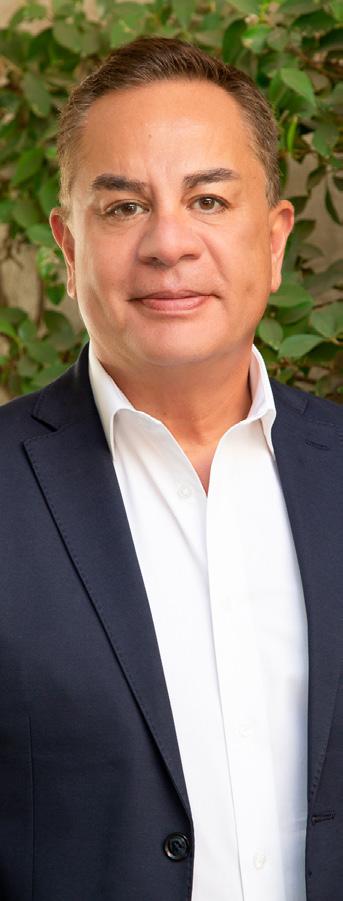
Of those, nine are non-incumbent Democrats running for open legislative seats. At least one gay Republican plans to be a candidate for a South Bay Senate seat, though they have little chance of defeating the incumbent in the heavily Democratic district.

And the list could grow depending on what happens in the races for state Assembly and Senate seats covering San Francisco. As of now, gay state Senator Scott Wiener (D-San Francisco) has pulled papers to run for reelection in 2024.
But his plans could change should Congressmember Nancy Pelosi (DSan Francisco) opt to retire and not seek another term in the House next year. Wiener already has launched an exploratory committee for a House bid, having long been seen as a contender to succeed Pelosi when she decides to depart.
Were his legislative seat to open up, it is widely speculated that gay District 8 Supervisor Rafael Mandelman could jump into the race for it. He didn’t respond to an inquiry from the B.A.R. this week on if he was interested in doing so.

The race to succeed Assemblymember Phil Ting (D-San Francisco), who is termed out next year of his District 19 seat, could also draw an LGBTQ candidate. Queer BART Board director Janice Li has long been encouraged to run for it.
She told the B.A.R. this week that she didn’t “have any thing to share publicly at this time” about if she had decided to do so. Meanwhile, the city’s District 2 Supervisor Catherine Stefani, who has a younger lesbian sibling, announced in early March her candidacy for Ting’s seat covering San Francisco’s western neighborhoods and several of San Mateo County’s most northern cities.
Across the bay the race for an open Senate seat that sprawls across parts of Contra Costa, Solano, Sonoma and Napa counties has drawn gay former West Sacramento mayor Christopher Cabaldon to once again seek elected office. He announced on Monday his candidacy for the District 3 Senate seat that also includes parts of Yolo and Sacramento counties, as Senator Bill Dodd (D-Napa) is termed out next year.
“Energized to launch my candidacy for state Senate, representing the people of District 3,” tweeted Cabaldon April 3 along with a map showing the outline of the vast Senate seat.
Decades ago he had worked for lesbian former state lawmaker Carole Migden (D-San Francisco) as her chief of staff during her first term in the Assembly. He ran unsuccessfully for a state Assembly seat in 2008 and lost his mayoral reelection race in 2020, which ended his run of serving as an elected leader of his riverside city since 1996.
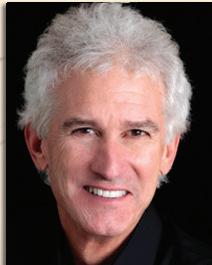
A higher education consultant, Cabaldon told the B.A.R. Wednesday he is planning to have smaller campaign events in the various parts of the district in the coming months rather than one large kickoff event. Having spent the last two years out of the political spotlight, he said he had time to focus on more personal interests and recharge
ahead of seeking public office again.
“I had such a purposeful, meaningful, productive run in my own city, and the regional and national levels frankly.
I like solving problems; I like fighting for the rights of all and solving tough problems, that is what is needed in the Legislature and certainly in our region,” said Cabaldon, who has also been working with philanthropic groups to address climate change and housing issues since stepping down as mayor.
Another out former Assembly candidate is also seeking election to the state Senate next year. Lesbian former Richmond city councilmember Jovanka Beckles, now an elected member of the board that oversees the AC Transit public transportation agency, is seeking the East Bay’s open 7th Senate District seat that spans western Contra Costa and Alameda counties from Rodeo south to the San Leandro border.
Beckles is one of five Democrats seeking to succeed termed out Senator Nancy Skinner (D-Berkeley). The seat largely mirrors Skinner’s current 9th Senate District but was renumbered during the 2020 redistricting process.
In 2018, Beckles fell short in her bid for an Assembly seat but went on to win election to her Ward 1 seat on the transit board two years later. She is once again vying to become the first LGBTQ member of the state Legislature from the East Bay and the first out Black female state legislator.
Beckles, who is also Latina, told the B.A.R. this week that she is planning to hold an official kickoff event for her Senate campaign on Saturday, April 29. While the details are still being worked out, it will likely be held in Richmond.
“I am proud of the city in which I live and want people to be proud of the fact we have an opportunity to have a state senator from Richmond,” said Beckles, who was born in Panama City, Panama, and immigrated to the U.S. with her parents in 1972.
Recalling her past crowded race for a legislative seat, Beckles said she expects the Senate campaign to be both “a rough ride” and “a heavy lift.” Other elected officials already in the race are Berkeley Mayor Jesse Arreguin Oakland City Councilmember Dan Kalb and former Assemblymember Sandré Swanson, who departed the Legislature in 2012.
“I have a very excited base, and it is my hope that with that excitement comes a lot of volunteers to make that heavy lift a little bit more bearable for all of us,” said Beckles, who recently updated her campaign site at https://jovanka4casenate.com/ with a number of endorsements from fellow progressive leaders such as gay Pinole City Councilmember Devin Murphy, currently serving as mayor, and Alameda County District Attorney Pamela Price
Also seeking the Senate seat is California Labor Federation President Kathryn Lybarger, who lives with her wife, Nina Ackerberg, in Berkeley. A gardener at UC Berkeley
since 2001, Lybarger has also served as president of the UC system’s largest employee union, AFSCME Local 3299, since 2011.
Lybarger, who earned an MFA from the now-closed San Francisco Art Institute, hadn’t responded to the B.A.R.’s request for comment about her candidacy by its print deadline Wednesday. She has yet to launch a campaign website but has been posting updates to her Facebook account at https://www. facebook.com/lybargerforsenate.

In addition to various labor groups’ endorsements, Lybarger picked up the backing of freshman Assemblymember Liz Ortega (D-Hayward) last week. (Ortega defeated several out candidates last year to win election to her Alameda County seat.)
“Kathryn has been leading on the frontlines fighting for workers rights, healthcare, housing and equality. She will make a great Senator and I look forward to collaborating with her on the issues that matter to working people!” wrote Ortega in announcing her endorsement.
Reviving her bid to serve in the Legislature and become one of its first bisexual female members is Palm Springs City Councilmember Christy Holstege. She confirmed this week the speculation that she would once again seek the 42nd Assembly District seat, which she lost to Republican Greg Wallis last November by just 85 votes.
The news coincided with Holstege revealing in a Twitter thread Monday that she had suffered a miscarriage on Sunday, her second time doing so in as many weeks.
With easy one hour flights from San Francisco, it’s easy to see why many consider buying a second home or retiring in Palm Springs, a very LGBTQ friendly city that’s clean, has less traffic and is beautiful.
I work in real estate in San Francisco, and live in Palm Springs. I can help with the sale of your home in SF and help you find your new home in Palm Springs.

Planning Ahead is Simple
Planning Ahead is Simple
The benefits are immense.
Planning Ahead is Simple
The benefits are immense.
When you plan your life celebration and lasting remembrance in advance, you can design every detail of your own unique memorial and provide your loved ones with true peace of mind. Planning ahead protects your loved ones from unnecessary stress and financial burden, allowing them to focus on what will matter most at that time—you.
The benefits are immense.
When you plan your life celebration and lasting remembrance in advance, you can design every detail of your own unique memorial and provide your loved ones with true peace of mind. Planning ahead protects your loved ones from unnecessary stress and financial burden, allowing them to focus on what will matter most at that time—you.
When you plan your life celebration and lasting remembrance in advance, you can design every detail of your own unique memorial and provide your loved ones with true peace of mind. Planning ahead protects your loved ones from unnecessary stress and financial burden, allowing them to focus on what will matter most at that time—you. Contact
She will be on the ballot along with her colleague Palm Springs City Councilmember Lisa Middleton who is seeking the open 19th state Senate District seat. If elected, she would be the state’s first transgender member of the Legislature.
Also running for Southern California legislative seats are lesbian Assemblymember Sabrina Cervantes (D-Corona), who is vying for the open Senate District 31 seat, and her younger queer and bisexual sister, Clarissa, who is seeking to succeed her sibling in her Assembly District 58 seat. Gay Lynwood City Councilmember José Luis Solache is run-
Proudly
Proudly serving our Community.
Proudly
April 6-12, 2023 • Bay area reporter • 9 t Politics >>
us today about the beautiful
to create a lasting legacy at the
Contact
ways
San Francisco Columbarium.
1306 / COA 660 One Loraine Ct.
San
SanFranciscoColumbarium.com
serving the LGBT Community. FD
|
Francisco | 415-771-0717
us today about the beautiful
to create a
at the
Contact
ways
lasting legacy
San Francisco Columbarium.
serving the LGBT Community.
today about
at the
us
the beautiful ways to create a lasting legacy
San Francisco Columbarium.
FD 1306 / COA 660 One Loraine Ct. | San Francisco | 415-771-0717 SanFranciscoColumbarium.com
3 bedroom, 2 bath homes start at $790k plus with pools. 2 Bedroom Condos start at $275k Contact Mark Anthony Venegas at 415.955.7968 cell/text or email markanthony.venegas@sothebysrealty.com CONSIDERING Palm Springs?
Barry Schneider Attorney at Law •Divorce w/emphasis on Real Estate & Business Divisions •Domestic Partnerships, Support & Custody •Probate and Wills www.SchneiderLawSF.com 415-781-6500 *Certified by the California State Bar family law specialist* 315 Montgomery St , Ste. 1025, San Francisco, CA The Scott W. Wazlowski Vice President of Advertising advertising@ebar.com 44 Gough Street #302, San Francisco, CA 94103 (415) 829-8937 • www.ebar.com Advertise!
AC Transit board member Jovanka Beckles, left, and UC Berkeley gardener and labor leader Kathryn Lybarger are running for the East Bay’s District 7 state Senate seat.
Courtesy Jovanka Beckles
Courtesy
See page 12 >> Facebook
Former West Sacramento mayor Christopher Cabaldon is seeking a state Senate seat.
reSITE.org
Weapons
by Gwendolyn Ann Smith
On March 27, a gunman used an AR-15 military-style weapon to shoot open a lock to a door at The Covenant School in Nashville, Tennessee. Minutes later, six people, including three children, lay dead. It is an all-too-common tragedy in the
United States, enough that this killing is just one of dozens so far this year, part of the background static of American life.
Tennessee doesn’t have a red flag law when it comes to purchasing weapons, and the shooter was able to purchase two of the three weapons they had with them legally. Such laws
Overnight Pet Sitting
serving the San Francisco Bay Area, Palm Springs, and beyond Live-in pet and home sitters keep pets on their regular routine, in their familiar, comfortable environment. Your pets will be less stressed than if they were to stay in a boarding facility. We are bonded and insured. Your home will be continually occupied, providing safety and security. Mail and packages will be brought in daily. The former owner of a highly respected pet grooming business in the Bay Area, Pet Daddy Wayne has more than 20 years of experience working with animals. Call 415-301-1909 or visit ThePetDaddies.com
DUGGAN’S
3434 – 17th StREEt SAN FRANCISCO, CA 94110
Thomas V. Halloran General Manager
A native San Franciscan with 40 years of professional experience assisting families in need.
A longtime resident of the Eureka Valley, Castro and Mission Districts; a member of the Castro Merchants Association and a 25 year member of the Freewheelers Car Club. At Duggan’s Funeral Service, which sits in the heart of the Mission, we offer custom services that fit your personal wishes in honoring and celebrating a life.
We are committed to the ever-changing needs of the community and the diverse families we serve.
Please call for information
415-431-4900 or visit us at www.duggansfuneralservice.com
FD44
One-1
Two-2
allow family members or law enforcement to petition a court for an order to prevent someone from having a gun. According to reports, the attack was planned well in advance, with detailed maps, as well as possible secondary locations. The shooter was stopped before they could go any further, however, and killed by police.
The shooter, 28, who identified themself as Aiden Hale on their LinkedIn, had attended The Covenant School, a private Christian campus, about a decade ago. It is, perhaps, coincidental that the church attached to the school, Covenant Presbyterian, had a sexual abuse scandal during the same timeframe as the shooter’s attendance. Nevertheless, Metropolitan Nashville Police Chief John Drake told Lester Holt of NBC News that it is possible the shooter felt “resentment” over having attended The Covenant School.
The rampage echoes so many mass shootings, with a killer who made their way into the school, using a militarytype rifle to dispatch as many in attendance as possible. By this point, we’re all but numb to the usual parade of “thoughts and prayers” followed by no meaningful discussion of ways to curtail the availability of assaultstyle weapons. We are all pretty familiar with how this goes, how the issue of ready avail ability of such weapons have made Americans far less safe, and how the right wing will balk at any sort of meaningful gun reform.

Except there is one thing different in this story: Drake said that the shooter was a transgender person. Specifically, transmasculine, adding, “We’re still in the initial investigation into all of that and if it actually played a role into this incident.”
This has not stopped many from using this information to declare that the shooter’s trans status was the cause of the shooting.
The New York Post ran with the headline, “Transgender Killer Targets Christian School,” dovetailing well with Tucker Carlson of Fox News, who claims that the shooting is an example of the hatred transgender people supposedly have against Christians.
“Transgenderists (sic) hate Chris-
<< News Briefs
From page 2
mittee that serves four counties: San Mateo, Santa Clara, Santa Cruz, and Monterey.
The theme of the brunch is “Progress Never Stops.” Gloria is the first elected LGBTQ mayor of California’s second largest city and is a former
tians above all, because Christians refused to join every other liar in our society and proclaim that transgenderists (sic) are gods with the power to change nature itself,” said Carlson on his Fox News show. “For that refusal, that unwillingness to bow down and worship a false idol, in this case of transgenderism, they were murdered.” It feels silly to have to note this but no, transgender people –“transgenderists” is not an actual term – do not feel we are gods with any domain over nature, or any such thing. That whole notion is somewhere far off from the reality of trans lives.
Carlson has been far from the only one on the right to make such attacks, with many speculating that hormone replacement therapy fueled the killings, as well as using outdated notions of transness itself being a mental illness.
Seeing the backlash against transgender people playing out in real time, I knew that – much like when a mass shooting is committed by a non-white, non-Christian man – we would be speared in exactly the way done by Carlson and others. It would be our trans nature to blame, our “ideology” that killed children. Never mind that such accusations never surface when the shooter is white, is Christian, and isn’t trans.

I made a statement on my Twitter account with this in mind, recom-
state assemblymember, where he was majority whip.
The event will also feature WooWoo Monroe, an iconic San Jose drag performer.
Tickets are $225 and can be purchased at https://bit.ly/3zt7aEb.
Writers can pitch works to agents or publishers
The San Francisco chapter of the Women’s National Book Association will hold its 20th anniversary of “Pitch-O-Rama,” where writers can pitch their completed work to up to seven agents or publishers in one day.
The virtual event is scheduled for Saturday, April 29, from 8 a.m. to 1
Obituaries >>
mending to my community that it may be wise to keep a low profile for a few days, while everything was sorted out.
It was fascinating to watch the attacks come: how I wasn’t honoring the dead children, how I needed to denounce transgender people, not protect them, and, of course, plenty of not-so-veiled statements against my own health and well-being.
According to the Gun Violence Archive, at gunviolencearchive.org, there have been 130 mass shootings in the United States this year. Thirty-seven of those, like the one at The Covenant School, happened in March.
It may be that one of those shooters was a transgender person. The majority of all such perpetrators are white, straight, and non-transgender. For them, media outlets often depict them as the lone wolves and the troubled souls for whom we should spare a little pity. Their stories are treated with a nuance that requires details and understanding – and are quickly forgotten.
Not so for this case, where – even as police ask for more time to study the shooter’s reported manifesto – it’s now the right’s example of the violent transgender person, who somehow typifies transness better than countless transgender people who have never fired a weapon.
Less than a week before the shooting at The Covenant School, Carlson was arguing on his show that transgender people should not be allowed to own weapons. It’s about the only time he has seemingly stood for gun control. This shooting has played right into his hand, and he continues to echo such statements. Not that I ever expected him to say much of the same about the 96% of mass shootings by straight white men.
In case it isn’t clear, I offer no pass for a shooter because they were trans. A murderer is a murderer – but it seems to me that people like Carlson and others simply want to use this shooter as a weapon of their own, harming all transgender people, and adding even more tragedy to an already horrific situation.t
Gwen Smith would like to see some reasonable gun control in her lifetime. You’ll find her at www.gwensmith.com
p.m. (Pacific time).
Kathleen Archambeau, an awardwinning Bay Area lesbian nonfiction writer and journalist who’s a board member of the women’s book association, stated in an email that with the current climate of books being banned and drag story hours being attacked, “getting our words out has never been more important.”
The cost is $65 for WNBA-SF members and $95 for non-members. To register, go to https://bit. ly/3U3zFBMt
Two parking spaces available to BMR renters for an additional $100 a month and will be offered to households in lottery rank order. Must be income eligible and must not own a home. Households must earn no more than the maximum income levels below:
55% AMI
55% AMI (MOHCD)
1 person- $53,350; 2 persons-$60,950; 3 persons-$68,600;

4 persons-$76,200, 5 persons-$82,300
Applications must be received by 5PM on Friday, April 14, 2023. Apply online through DAHLIA, the SF Housing Portal -DAHLIA at housing.sfgov.org. Please contact the Imagine That Consulting for building information at (916) 686-4126 or 603tennesseebmr@gmail.com.

Units available through the San Francisco Mayor’s Office of Housing and Community Development and are subject to monitoring and other restrictions. Visit sf.gov for program information.
Rama Selassie Barnwell
December 30, 1948 – January 9, 2023
Rama was born in Florida, the son of a pastor. His family then relocated to Cleveland, Ohio.
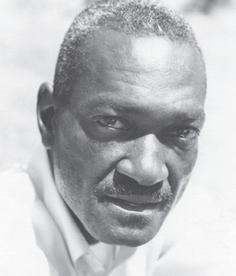
Rama served in the U.S. Navy in San Diego, after which he received a degree in applied arts and criminal justice from San Diego State University. He moved to San Francisco in the 1980s during the early days of the AIDS epidemic and devoted himself to public health. He worked in the late 1980s at the UCSF AIDS Health Project as an
HIV test counselor, providing support at a time when there was little hope for the thousands testing positive. In 1991, he earned a master’s degree in public health from San Jose State University. He worked untiringly on his Ph.D. dissertation until his own HIV-related health issues came between him and his goals. Despite health issues, he continued as an HIV test counselor into the 2000s. He returned to Ohio in the early 2000s to live with his sister, Audrey, who cared for him until his passing. Over the years, he talked of not expecting to survive long. Yet, he did and always with his beautiful spirit and love. He was a kind, deep, and gentle soul with a heart who touched many professionally and personally. He served and he is missed.
10 • Bay area reporter • April 6-12, 2023 t
Market Rate (BMR) Rental Apartments Available 603 Tennessee at 603 Tennessee Street, San Francisco, California 94103
Below Market Rental Units Available
Below
3
rental unit available
per month
bedroom
at $1,436.00
rental units available
per month
bedroom
at $1,597.00
<< Commentary
FUNERAL SERVICE the DUGGAN WeLCh fAmiLy
T h e P e t D a d d i e s
Christine Smith
John Ferrannini contributed reporting.















LGBTQsurvey.com Grab a coffee, take the survey, Grab a coffee, take the survey, make a difference. Take the 17th Annual LGBTQ Community Survey® LGBTQ research helps non-profits, universities and businesses better understand and serve our community. Download survey results free of charge at cmi.info Proudly LGBTQ-Owned and -Operated. A pioneer in LGBTQ research since 1992. Your information is confidential, used for research purposes only. You will not be contacted for marketing purposes. C M Y CM MY CY K CMI_Full_Page_English_Bleed.pdf 1 3/13/23 7:08 PM Take the survey now on your mobile device: Scan QR code to begin.
Heklina
From page 1
“We are shocked and devastated to learn of the passing of Heklina today,” the club wrote. “Sending love to all.”
Gay former state assemblymember Tom Ammiano told the B.A.R. he will miss the drag artist.
“A true professional [and] with drag under attack her passing is especially wounding,” wrote Ammiano, who also served on the San Francisco Board of Supervisors and school board. “As an aside, she bartended at events for folks with special needs at the Oasis [and] as a former special education teacher, I loved her for that.”
State Senator Scott Wiener (D-San Francisco) stated that Heklina “was an icon in the truest sense – funny,
<< Castro Theatre
From page 1
asked the historic preservation commission to further clarify the language in the proposed ordinance to more accurately restate the factual findings approved by the planning commission, but the commissioners declined to do so. At the land use committee meeting, numerous speakers advocated that the supervisors amend the preservation commission’s determination with “fixed seating.” District 5 Supervisor Dean Preston said he’s in favor of such an amendment.
APE told the Bay Area Reporter for a recent report that it will commit to having at least one-third of the theater’s programming remain film but that “daily film screenings are not going to happen again.”
Peskin seemed to target this in his remarks.
“This is not a business model where the venue can be open every day. The theater is going to be dark about half a year,” he said. “I don’t see any reason why we can’t have our cake and eat it too and run the joint as a film operation with rich LGBT programming that 180 days.”
Otherwise, the supervisors may come to a decision APE wouldn’t like, Peskin said.
“How about, in the intervening two weeks ... you guys work out the terms and then we can get back into the issue around the seats,” Peskin said. “I don’t know how much it costs to run a movie theater but I don’t think it’s that expensive and I don’t think it has
<< Political Notebook
From page 9
ning to succeed Assembly Speaker Anthony Rendon (D-Lakewood), who is termed out of his District 62 seat, while gay veteran Joseph C. Rocha is vying to succeed Assemblymember Brian Maienschein (DSan Diego), who is termed out of his District 76 seat.
<< Guest Opinion
From page 8
My best memories of Easter are still the ones from when I was pastor of the historically LGBTQ Metropolitan Community
caring, outrageous, and brave.”
“I first saw Heklina perform when I was a young gay man in the 1990s, new to San Francisco,” Wiener wrote. “Over the years, I got to know her and helped her find a space for Oasis. I’ve rarely worked with someone as fierce, creative, and dedicated.
“Heklina was also a staunch defender of drag – which is under extreme attack right now – and created opportunities for young drag queens to find their space,” Wiener added. “While we grieve, we must honor her memory by remembering the joy she brought us and the importance of the art form to which she dedicated her life.”
As Heklina, Grygelko was known for founding the old Trannyshack drag show in 1996 at the old Stud bar. (The name of the show was later
to be leased out to parties for $6,000$10,000 a day.
“Don’t be yelling at me when this whole deal tanks,” Peskin wryly added.
“Just saying.”
Mandelman told the B.A.R. that since the issue of the historic preservation commission’s updated interior landmarking will be taken up by the committee on April 17, the megahearing of the planning and historic preservation commissions on the appropriateness of APE’s plans will have to wait till May 18. (It had been set for April 13.)
“I think it was a sensible move and gives us a couple more weeks to work with the parties,” Mandelman stated when asked about the two-week delay.
In fact, during his opening remarks, Mandelman, who is not on the committee but was invited because the theater is in his district, indicated he wanted a two-week continuance.
David Perry, a spokesperson for Another Planet Entertainment, stated to the B.A.R. that “our continued thoughtful and cordial discussions with the leadership of the Castro Conservancy have led to a better plan. Today’s continuance gives us additional time to work with them, and with everyone, who truly understands what it will take to save the Castro for future generations.”
“Another Planet shares that passion, and is why we are endeavoring so hard to truly save the Castro Theatre and everything it represents, especially for the LGBTQ and film communities,” Perry stated. “We were encouraged today to hear the growing support for, and true understanding of those
Solache and Rocha lost their previous campaigns for legislative seats.
Over the weekend gay GOPer Anthony Macias informed the B.A.R. he planned to run against Senator Dave Cortese (D-San Jose) in the South Bay’s 15th Senate District. For years Macias has vied for legislative seats but has either failed to make the ballot or fallen short when he has.
Half of the current 12 members of
Church-San Francisco in the Castro district. In the midst of AIDS, that community celebrated resurrection, along with the Sisters of Perpetual Indulgence, on Castro Street, and the church on Eureka Street. We did not let our seemingly limitless grief, our
changed to “Mother.”)
At the start of each Trannyshack, San Francisco’s outlandish, no-holdsbarred Tuesday night drag show, a snippet of the old “Muppet Show” theme music warned “it’s a kind of torture, to have to watch the show,” as the Bay Area Reporter reported in 2008.
The joke belied the fact that the performances were more than just boys in dresses lip-synching to pop ballads or camp classics. The weekly shenanigans often masked what in reality was a uniquely queer riff on the political, social, racial, and gender controversies of the day.
Heklina invited not just drag queens – many of whom went on to become stars in their own right – but also female performers, known as faux queens, and drag kings to share her stage. By doing so, Heklina threw out the rulebook on what it meant to be a drag performer.
Adriana Roberts, a trans woman and an early Trannyshack performer, penned a tribute on Facebook.
“She was a Master Class in successful Nightlife Production: wrangling order from chaos, managing a stage, managing a crowd, putting down hecklers, assembling trusted crews, booking budding queens, promoting events, following one’s heart – but also always being aware of what actually sells,” Roberts wrote. “And she did it all with snark, wit, and balance for over 25 years.”
Roberts, a former production designer at the B.A.R., wrote, “Coming from a punk rock ethos, she created a space that welcomed performers from across the gender spectrum, at
plans, which we encourage everyone to view on the Castro website.”
Preston, who is vice chair of the committee, offered to amend the historic preservation commission’s proposed interior landmarking’s reference to the “presence of seating” to “fixed theatrical seating configured in movie palace style,” as the groups opposed to APE’s plans requested.
At the meeting’s outset Preston said he could proffer the amendment that day or in two weeks. At the end, however, he said, “The [San Francisco] city attorney’s office requires additional time and the amendment that’s proposed may also require amendments to the findings in the ordinance, so it will not be able to be introduced ‘till the next meeting, so in deference to the city attorney and the ongoing process Supervisor [Rafael] Mandelman mentioned, formal amendments will wait till this comes back in two weeks.”
Stephen Torres, a queer man who’s the executive co-chair of the Castro LGBTQ Cultural District board, told the B.A.R. that “we are grateful to Supervisor Preston’s proposed amendment of the draft language retaining fixed theatrical seating and the land use committee members and Supervisor Mandelman’s commitment to due process and for taking seriously the findings of the District and our collaborative historians whereas APE has not and has continued evade substantive community engagement.”
Peter Pastreich, a straight ally who’s the executive director of the Castro Theatre Conservancy, told the B.A.R. that the conservancy is “happy with
the Legislative LGBTQ Caucus are expected to seek reelection next year, including gay state Senator John Laird (D-Santa Cruz) and bisexual Assemblymember Alex Lee (DSan Jose). Also running will be gay Assemblymembers Evan Low (DCupertino), Rick Chavez Zbur (DWest Hollywood), Corey A. Jackson, Ph.D., (D-Perris), and Chris Ward (D-San Diego).
mourning, or the political challenges that we faced overcome us. A favorite Easter song was from our own canon of sacred music, as sung by Bette Midler in “The Rose:”
“Just remember in the winter far beneath the bitter snows.
a time when drag was VERY codified into TIRED (her words) tropes of men in sequined gowns doing diva lip-syncs. None of us realized it at the time, but she helped revolutionize the concept of what drag could be, breaking its mold years before the rest of the world caught on.”
Mainstay in queer nightlife
As the B.A.R. noted in a March 2022 article, since the early 1990s, Heklina had been a mainstay in Bay Area queer nightlife. From the first irreverent drag nights at The Stud, to Trannyshack’s expansion at DNA Lounge that included annual contests, Heklina has often hosted the most prominent drag and nightlife events which included her own numbers.
In 2015, along with D’Arcy Drollinger and other investors, Heklina opened Oasis in South of Market; the same building that once housed the original Oasis. The new nightclub has become popular for not only drag shows and DJed dance nights, but comic plays and musicals, cabaret concerts and community fundraisers. Heklina later sold her share of Oasis ownership and moved to Palm Springs, while still keeping a foothold in the Bay Area’s nightlife scene.

And, of course, Heklina was known for her deadpan line delivery as Dorothy (Bea Arthur’s character) in stage productions of episodes of the classic sitcom “The Golden Girls.” The longrunning show became an annual holiday tradition in San Francisco.t

the outcome of today’s land use and transportation committee meeting.”
“President Peskin and Supervisor Preston both expressed the understanding that the issue at hand is greater than saving the seats,” Pastreich stated. “With the continuance, it was made clear that the Castro Theatre is a vital community asset, and that Another Planet Entertainment has the opportunity to act now and work with the community to find a compromise that ensures the theater does not lose the vibrancy for which it is known.”
During the meeting, community members spoke in support of amending the historic preservation commission’s recommended interior landmarking to include the fixed seating and raked floor.
“I request the committee clarify the draft landmark legislation for the Castro Theatre. In place of the phrase ‘presence of seating’ the ordinance should state ‘fixed theatrical seating configured in movie palace style,’” queer public historian Gerard Koskovich said during the hearing. “The landmark designation fact sheet itself … identifies movie palace seating as a defining characteristic. … and yet the draft does not properly identify this finding. They are intrinsic to the form of the auditorium space as the auditorium of a movie palace.”
Terrance Alan, a gay man who’s the president of the Castro Merchants Association, said that the city economics experts should find out the impact of APE’s plans on the merchant community, which he said has been badly hurt by the fact that the theater has been
Ward, however, could decide to run to succeed termed out lesbian Senate President pro Tempore Toni Atkins (D-San Diego) now that San Diego County Supervisor Nathan Fletcher, set to resign in May, has bowed out of the race in order to seek treatment for post-traumatic stress and alcohol abuse. The news came late last month amid revelations that Fletcher was facing legal action for alleged sexual dis-
Life’s the seed that with the sun’s love In the spring becomes the rose.”
That was never included in any church hymnal, but it still speaks to me. Let this Easter give full expression to an ever-expanding notion of resurrections, one that includes resilience, resistance,
closed most days this year – and in the past three years due to the COVID pandemic.
“We have for decades relied on the Castro Theatre. What APE is saying is they will bring lots of people to the neighborhood, and if you evaluate their business plan they will bring a lot of people from 8 [p.m.] to midnight. Will that benefit the merchants community? I’m not sure,” Alan said. “Does APE’s plan work or does APE’s plan not work? I’m not going to predict the future but I wanna hear what they [the office of economic analysis] have to say. The seats have become a bludgeon because APE is such a bully.”
Community voices were not all opposed to APE’s plans, though. As the B.A.R. reported last week the Castro Community Benefit District has been passing around a petition asking business owners to sign on to support APE’s plans, though the merchant’s association. CBD officials reiterated that during public comment at the hearing.
Andrea Aiello, a lesbian who is the CBD’s executive director, said, “I’d like to express our strong support for Another Planet Entertainment’s proposal. This is critical. They need the flexibility to recoup the $15+ million to renovate the theater. Of that $15 [million], $7 million is going to improving the film experience. They’ve committed their money to restoring the Castro to its original glory and to keeping films. They have to flatten the floor to put the HVAC [heating, ventilation, and air conditioning] system in and in this day and age they need fresh air, they need circulation.”t
crimination against several women. Also being talked about as possibly running for Atkins’ 39th Senate District seat are queer leaders Georgette Gomez, a former San Diego City Council president, and Janessa Goldbeck, a veterans advocate. Gomez lost her bid for an Assembly seat last year, and the two women both came up short in the 2020 race for a San Diego congressional seat.t
revolution, reparations, and reconciliation. Happy Resurrection Day!t
12 • Bay area reporter • April 6-12, 2023 t << Community News
<<
Heklina, center, as Dorothy in her long-running drag spoof of “The Golden Girls.”
Gooch
The Reverend Jim Mitulski is the pastor of the Congregational Church of Belmont, California. www.ccBelmont.org
Heklina, left, enjoyed the celebration with D’Arcy Drollinger on New Year’s Eve 2019 at Oasis.
Gooch
by David-Elijah Nahmod
The beloved Sisters of Perpetual Indulgence will return with their annual tradition of celebrating Easter in Dolores Park on April 9. This year’s party marks the 44th anniversary since the Sisters first came into being, and Sister Tilda NexTime couldn’t be more excited.
“44 is such a magical number,” said Tilda in an interview with the Bay Area Reporter. “It also makes us proud of our history and how far we’ve come as an organization since Easter 1979.”
This year’s celebration has a bit of a somber cloud hanging over it, given the anti-drag and anti-trans backlash going on in red states. Tennessee recently passed a law restricting drag shows in public, though that law has been temporarily blocked by a federal judge.
“Our community is under attack,” said Sister Tilda. “Instead of focusing on the issues that are actually turning this country into one of the most dangerous places on Earth, such as gun violence, radical politicians are hiding behind the Bible and worrying about drag queens, labeling us as dangerous. And what’s even worse, they are trying to strip away the basic human rights LGBTQ people have fought for over decades. We can’t let the real forces of evil take over.”
The celebration in Dolores Park promises to be a welcome respite from these issues. The day will be filled with all kinds of fun activities, from a family-friendly Easter egg hunt and story time, to the more adult in nature Foxy Mary and Hunky Jesus contests.
The party commences at 10am with the family activities. Then, at noon, community activist Honey Mahogany will take to the main stage to host a variety show filled with fabulous per-
Celebrate Easter with the Sisters
formers and surprise guests. This year’s line-up includes San Francisco favorites such as Connie Champagne, Kitten on the Keys, The Cockettes, Trixie Carr, Alex U. Inn and the Mommaz Boyz, among others.
“From 10am until noon, there’s an Easter egg hunt and lots of fun for the little ones,” said Sister Tilda. “The Easter Bunny will also make a very special appearance. We do this every year and the families love it.”

And though the afternoon portion of the day will be more adult in nature, perhaps not suitable for children under 16 years of age, the Sisters promise that nudity and profanity are not allowed.
“This year our theme is influenced by musical theater, burlesque, peep shows, vaudeville, drag extravaganza, and some of San Francisco’s most notorious memories such as the Lusty Lady
venue and The Cockettes,” Sister Tilda explained. “This year our theme is a bit more risqué than previous years, but still keeping it classy.”
The Hunky Jesus and Foxy Mary contests are one of the most fun and traditional events in San Francisco.


“Contestants don’t need to sign up or anything,” she said. “They just need to show up already in costume near the stage thirty minutes before each contest. They start at 1pm. It’s all about fun, imagination, uniqueness, and talent. It’s not about being hunky or foxy in a purely sexual way. It’s about celebrating creativity, positive energy, freedom and diversity.”
Sister Tilda sang the praises of main stage host Mahogany.
“Honey is one of the most important activists and personalities we have in this city,” she said. “Her fight for equality and human rights is an ex-
ample to be followed. We love her and are extremely thankful for having her as one of our MCs.”
And for those on the fence about attending the celebration, Sister Tilda has a simple message.
“You can’t say that you’ve experienced everything San Francisco has to offer if you’ve never been to the Sisters’ Easter celebration at Dolores Park,” she said. “It’s like visiting the Louvre Museum in Paris and not seeing the Mona Lisa.”
CDC guidelines for outdoor events will be followed. All attendees are encouraged to be fully vaccinated. Masks are recommended when around others whose vaccination status in unknown.t
Easter in Dolores Park with the Sisters of Perpetual Indulgence, April 9, 10am family events. 12 noon-4pm, adult events.
Dolores at 18th St. www.thesisters.org
SF Filmfest’s faves
by Brian Bromberger
The 66th San Francisco International Film Festival, the longest-running film festival in the Americas, runs from April 13-23. Stories from 37 countries will be featured. For the third year in a row, half of the lineup will be helmed by female or nonbinary filmmakers. For the first time, the festival hub will be at the CGV San Francisco, in addition to the other SF locations, The Castro Theatre, The Dolby Theater, and some East Bay venues.
As usual, SFFILM features several films of LGBTQ-related interest. “Dalíland” is the homecoming of female director Mary Harron (“I Shot Andy Warhol,” “American Psycho”) after a fouryear absence and a return to her original subject of the New York art world in the 1970s.
Purportedly focusing on Spanish surreal artist Salvador Dalí (Ben Kingsley), the film is a coming-of-age saga about his assistant James (Christopher Briney) helping him prepare for an art gallery opening in which Dalí must provide more paintings. This period occurred towards the end of his career, with Dalí a creative shadow of what he once was.
Dalí was one of the first performance artists, a master of publicity for himself, aided by his narcissistic and money-hungry wife Gala (Barbara Sukowa), who wanting to continue their lavish lifestyle (full of parties and drugs) has Dalí sign secondhand lithographs they sell to unsuspecting collectors. Their dysfunctional marriage is a sham, yet they need each other, he providing the fame and she engineering their finances. Both Dalí and Gala come off as caricatures yet it works

because these two great actors make this codependent, combative relationship work.
Fans of Mary Tyler Moore are in for a treat with director James Adolphus’ and producer Lena Waithe’s terrific HBO documentary, “Being Mary Tyler Moore.” The film serves as both a biography but also underscores the cultural impact of her brilliant career, making a strong argument that she helped define a new understanding of American womanhood, especially single women.
While there are plenty of archival footage and video clips from her groundbreaking roles as Laura Petrie in “The Dick Van Dyke Show” and Mary Richards in “The Mary Tyler Moore Show,” Moore is her own narrator through the many interviews and talk show appearances she made in her almost 60-year career. The film is an inspirational highpoint in this year’s festival.

We return to the 1970s again, only this time Rome in Emanuele Crialese’s French-Italian drama “L’Immensita” starring the radiant, incomparable Penelope Cruz at the peak of her craft. She plays Clara, an unhappily married mother

with mental health issues, raising three kids and shakily tolerating her husband’s infidelities. Her eldest daughter, Adri/Adriana (Luana Giuliani) is experiencing gender dysphoria and wants to be called Andrew.
The whole family is dysfunctional with Adri’s brother Gino, bulimic and habitually taking a dump in the closet. Her father is totally resistant to his transgender child. Adri becomes infatuated with an outcast Roma teen named Sara who accepts Adri as a boy. Crialese unites both mother and trans Adri as outsiders. The film mostly succeeds though there is a pervading aura of sadness.
“Pete” is a delightful animated short film about eight-year-old Pete, having been born Kathy, who is determined to play Little League baseball with her friends. When the crowd realizes Pete isn’t another boy, trouble ensues. Queer director Bret Parker, who worked at Pixar for 26 years, bases the story on her wife Pete Barma. An enchanting teaching parable about how change and acceptance is possible, this is a much-needed reminder with all the anti-trans legislation pervading the U.S.

Joan Baez: I Am a Noise,” a documentary on the queen of folk music, looks back on her musical career but also her activism including her fight for civil rights, protesting the Vietnam War, and promoting justice movements throughout the world. The focus is on her 2018/2019 Fare Thee Well Tour., archival footage, and oral history will be used to glimpse this voice of a generation who recently turned 82. The question is whether the film will address her bisexuality, a subject previously only tacitly acknowledged by Baez.

One of the first black supermodels is finally getting due recognition in the documentary “Invisible Beauty,” on how outspoken activist Bethann Hardison emerged in the 1970s, mentoring such new talent as Naomi Campbell and Tyra Banks. Never content with the status quo, Hardison pushed for dialogue on representation and discussed race and diversity years before those issues were part of the cultural conversation.
See page 18 >>
 Barbara Sukowa and Ben Kingsley in ‘Dalíland’
Luana Giuliani and Penelope Cruz in ‘L’Immensita’
‘Being Mary Tyler Moore’
‘Pete’
‘Joan Baez: I Am a Noise’ ‘Invisible Beauty’
The Hunky Jesus Contest at Easter in Dolores Park with the Sisters in 2019
Steven Underhill
Barbara Sukowa and Ben Kingsley in ‘Dalíland’
Luana Giuliani and Penelope Cruz in ‘L’Immensita’
‘Being Mary Tyler Moore’
‘Pete’
‘Joan Baez: I Am a Noise’ ‘Invisible Beauty’
The Hunky Jesus Contest at Easter in Dolores Park with the Sisters in 2019
Steven Underhill
‘Merrily We Roll Along’
by Jim Gladstone
In the wake of Stephen Sondheim’s death 18 months ago, a rewarding wave of retrospection has surged. There have been numerous cabaret and concert tributes, regional and community theater revivals, and acclaimed New York revivals of both two Sondheim masterpieces – “Into the Woods” (coming to San Francisco this summer, with much of its cast intact) and “Sweeney Todd”— and two less universally adored works from his oeuvre, “Company” and “Merrily We Roll Along.”
An enjoyable production of the latter, now being staged by 42nd Street Moon, is well worth catching in one of its final five performances before closing after Sunday’s Easter matinee. The show offers some of Sondheim’s most melodic tunes – “Not A Day Goes By,” “Old Friends,” “Our Time”– compellingly sung by a strong central cast and an odd story structure that may strike first-time viewers as niftily meta-fangled but, in fact, dates back to the musical’s source material, the 1934 Kaufman and Hart play of the same name.
Sondheim, a famous lover of cryptograms and other puzzles, is often noted for the ingenious complexity of his songwriting. But he’s also drawn to complex narrative approaches.
“Company” explodes a group snapshot into smaller individual portraits; “Sunday In The Park with George” fast forwards by generations between acts; “Into The Woods,” interweaves the previously distinct plots of several Brothers Grimm tales; “Follies” simultaneously plays out its characters’ past and present.
So one can see the tricksy allure that Kaufman and Hart’s play must have
had for him. The play follows its showbiz characters in reverse chronology; a not-so-merry rewind from regretful middle-age to bright-eyed lost youth. While George Furth is the credited book writer, Sondheim has been recognized as not just the musical’s composer, but its primary architect.
Side by side by side
We meet the former songwriting team of Franklin Shephard (Will Giammona) and Charley Kringas (DC Scarpelli) in 1976. Frank is surrounded by sycophants at a premiere party for his latest formulaic moneymaking movie where he announces the end of his second marriage and cold-shoulders his old friends Charley (whose recent Pulitzer-winning play is of little concern amidst the lucre of L.A.) and Mary (Melissa Wolfklain), their steadfast gal pal whose decades of unrequited swooning for Frank have led to crabbiness with a side of alcoholism (It’s a thankless role; reflec-
A rewinding Sondheim revival
at
42nd
St.
Moon
Charley feel less specific than the female leads, in part because the their story is hamstrung by a connect-thedots simplicity that feels requisite to its finish-to-start telling. Once the audience is required to follow the plot backwards, complicating things further risks incomprehensibility. So Frank reads as a wunderkind-turned commercial sellout-turned boor; Charlie as a morally honorable artiste, uncompromising in his earnestness.
tive of, but not insightful about, the story’s time period).
This afterthought approach to women’s inner lives continues to sting through the final scene, set in 1957. It includes the meet-cutes not only of Frank and Mary (She’s heard his piano playing through their apartment building’s walls at all hours…and she adoooores it) but also of Charley and his soon-to-be wife Evelyn, who hasn’t appeared in a single other scene for the rest of the show.
And yet, marvelously, this production’s two most indelibly-etched characters are Beth (Juliana Lustenader) and Gussie (Christine Capsuto-Shulman), Charley’s first and second wives. The fact that this is the only way to clearly describe their roles underscores the lack of agency written into their characters. In their singing, though, these actresses dig deep bringing sharp definition to fuzzily written roles. Lustenader, a pellucid vocalist who brought similarly stirring emotion to
recent local productions of “Violet” and Sondheim’s “Passion,” perfectly shifts tone across her two renditions of “Not A Day Goes By,” one imbued with embitterment, the other brimming with optimism.
Capsuto-Shulman evinces Gussie’s consistently steely sense of self-worth even as she transistions from strategic seductress to scorned spouse. There’s little scenery in Kuo-Hao Lo’s minimalist set design, but what there is gets gloriously chewed in CapsutoShulman’s Lainie Kazan-cum-Fran Drescher delivery of “Growing Up” and Act II’s show-within-the-show “Opening” song.
Putting it together
Also making the most of a featured role is Chris Reber as Joe, a Broadway producer and Gussie’s first husband. His brusque, Runyon-esque presence brings welcome grit to every scene he’s in.
Giammona’s Frank and Scarpelli’s
Still, the songwriting here is sheer, clever pleasure and the cast delivers it deliciously. There are Easter eggs aplenty for musical theater buffs in the lyrics, including a lyric referencing “Funny Girl,” “Fiddler” and “Dolly,” and Sondheim’s knowing jokes about producers unreasonably demanding “more hummable” songs – delivered one of his most hummable scores. The backward structure also allows for a bit of flashy musical puzzle-making. The first version of many songs performed is a short version or just a snippet, functioning as a reprise might in a more conventional show. When the song is later reprised, it’s in the fuller iteration that would normally come first.
Finally, and befitting the Easter season, praise is due for the decades of fashion smartly paraded across the stage by costume designer Brooke Jennings. The robin’s egg blue outfit worn by Beth in Act I is at once periodperfect and drop-dead gorgeous, and the array of clothing on display in several large party scenes makes you wish you’d been invited.t
‘Merrily We Roll Along,’ through April 9. $35-$78. 42nd Street Moon at the Gateway Theater. (415) 2558207. www.42ndstmoon.org


Oakland Gay Men’s Chorus celebrates Black history
by David-Elijah Nahmod
For nearly 25 years, the Oakland Gay Men’s Chorus has brought choral music to East Bay stages. According to Melvin Terry, a singing member of the chorus, not all members of the chorus are gay, nor are they all men. Though the majority of the chorus membership is comprised of gay men, there are a few women, as well as trans members and even a few straight guys.

“We are a little bit of everyone, and we all get along,” Terry said in an interview with the Bay Area Reporter. “Anyone who can sing in tenor or bass range, irrespective of gender, gender
identity, sexual orientation or race is welcomed and embraced.”
The chorus is also a place where Black history is celebrated and honored. On April 15 and 16 they will perform “True Colors,” their Spring concert. The concert will include a performance of the song “My Heart Be Brave,” which the chorus describes as “an important contribution to music in the Black tradition.”
The song was composed in 2022 by Marques L.A. Garrett. Garrett, who is African American, was born in Virginia in 1984 and is a choral conductor in addition to his work as a composer. He currently serves as Assistant Professor of Music in Choral

Activities at the University of Lincoln, Nebraska. Garrett has also given the OGMC a setting of “Sonnet,” a poem that was written by James Weldon Johnson in 1893.
“When composers use a pre-existing poem or text as an inspiration to write music, they often call that a setting,” Terry explained. “For example, one might say that Garrett set the poem to music, meaning he composed original music that a choir can sing to Johnson’s poetry.”
Johnson (1871-1938) was also African American. He was a writer, a civil rights activist, a diplomat, a lawyer and a professor. He served as CEO of the NAACP from 1920-1930. He and his brother, J. Rosamond Johnson composed “Lift Every Voice and Sing,” which became known as the Negro National Anthem.
According to Terry, “Sonnet” is so named because it’s in the style of a Shakespearian sonnet.
“To me it’s really about talking to yourself at a deep level, your heart, encouraging it to stay strong and continue with the struggle for justice,” he said. “Be brave despite fear, anxiety and obstacles and you will get through the storm and see the light. Dr. Garrett’s timely composition of ‘My Heart Be Brave,’ based on ‘Sonnet,’ allows us to deliver the message in a lyrical, passionate and soul stirring way.”
Terry added that it’s important to honor Black history, which he says is American history.

“The many positive contributions of African Americans have often been overlooked,” he said. “These contributions as well as the history of slavery, Jim Crow, and the continuing negative effects of discrimination need to be illuminated to appreciate their significance in shaping the current state of the African American people in America today and help us to move forward in making this a just country for all.”
Terry feels that this is especially important in current times, when
there are multiple attempts to roll back rights for Queer, Black and Brown people and women.
“Illuminating composers and artists such as Dr. Garrett and James Weldon
Johnson is one of the ways we as performers can contribute to the effort,” Terry said.
The “True Colors” concert will also include the famous same-named Cyndi Lauper song and Jonathan Larsen’s “Seasons of Love” from “Rent.” The chorus also hopes to offer strength and encouragement to those in the community who are struggling with bullying, depression and mental health.
These issues will be highlighted by Jake Runestad’s “Please Stay” and “You Are Enough” from Aron Accurso’s “A Mental Health Suite.”
The OGMC will be joined by the New Voices Bay Area TIGQ Chorus, a mixed-voice choral ensemble for singers who identity as transgender, intersex or gender-queer.
“Two of our singing members of OGMC are also singing members of NVBA, which has made this a meaningful and natural collaboration,” said Terry. “With so much anti-trans rhetoric and hate across parts of the country, it seems especially urgent to support and lift up the voices if our siblings in the TIGQ community.”t
Oakland Gay Men’s Chorus, April 15, 7:30pm, Montclair Presbyterian Church, 5701 Thornhill Drive, Oakland. April 16, 4:30pm, First Presbyterian Church of Oakland, 2619 Broadway, Oakland, $15-60. www.oaklandgmc.org/tickets
16 • Bay area reporter • April 6-12, 2023
t << Theater & Music C10-0000523-LIC | C10-0000522-LIC | C10-0000515-LIC
CASTRO SOMA MARINA
Shop early and receive a Mystery Bag with qualifying purchase. Supplies are limited!
April 20th only. Spend $125+, get a $1 Mystery Bag. In-Store Only
Oakland Gay Men’s Chorus
Above: Composer Marques L.A. Garrett
Below: Oakland Gay Men’s Chorus member Melvin Terry
Left: Will Giammona, DC Scarpelli, Melissa WolfKlain in ‘Merrily We Roll Along’
Right: A party scene in ‘Merrily We Roll Along’
Both photos: Ben Krantz Studio
Sights and sounds
The Lavender Tube on shootings, shrinks and ‘Swarm’
 by Victoria A. Brownworth
by Victoria A. Brownworth

Whenwas the last time an LGBTQ person was headline news and it was a good thing? If you said “never,” you’d be right. When people ask us why we still work in LGBTQ media, the reason is always the same: balance.
The reveal that the suspect in America’s latest horrifying school shooting at The Covenant School in Nashville was a trans man, Aiden/Audrey Hale, 28, was a shock. And beyond the horror of the shooting itself and the lives it took, the shooter’s gender identity has been used by the GOP to ramp up attacks on trans people, which are already dangerously rabid.
Never mind that all but four mass shootings have been perpetrated by men with guns. Now the GOP is reifying their mantras about the dangers of trans people. Yet we know – as do Democratic politicians like the President and Vice President – trans people are actually disproportionately victims of violence, not perpetrators of it.
According to their social media, Hale began transitioning a few months prior to the March 27 assault that killed three children and three school staffers. The transition came after the death of a female partner, according to a former teacher, Maria Colomy.

The GOP has been uniformly terrible in response. Ignoring the desperate need for an assault weapons ban, GOP House and Senate members have focused on demonizing trans people.
Marjorie Taylor Greene, the House GOP’s most vociferous anti-LGBTQ member was suspended from Twitter for a week for transphobic comments.
This is another tragedy in the long list of mass shootings. Attacking trans people instead of the gun lobby will only add to the threat against the community.
GLAAD Awards

A counter to the demonizing of trans people in the wake of the Nashville shooting were two profiles of Black trans actor Brian Michael Smith.
The “9-1-1: Lone Star” star appeared in both Entertainment Weekly and People on March 31 talking about life as an openly trans male actor and about his marriage to teacher Denisse Perez.
At the 34th Annual GLAAD Awards on March 30, Smith was schmoozing with media about the awards and the work he is doing, not just as an actor, but as a visible trans man in a transphobic industry.

“Bros” and “A League of Their Own” took the top prizes at the GLAAD Media Awards, with “The White Lotus,” “What We Do in the Shadows” and “Los Espookys” among the winners at the Los Angeles ceremony.



“White Lotus” star Jennifer Coolidge joked, “here I am again, surrounded by gays.”

Check out the “Biggest Moments at The 34th Annual GLAAD Media Awards” on the GLAAD website and just breathe in all the fabulousness. (www.glaad.org)
Swarm Amazon Prime takes a dark dive into the world of obsessive fans with
“Swarm.” The psychological horror/ thriller series was created by Janine Nabers and Donald Glover and follows Dre (Dominique Fishback), a young woman whose queer obsession with Ni’Jah (Nirine S. Brown), a global pop star, takes a really dark turn.

“Swarm” is definitely a play on the Bey Hive, Beyoncé’s dedicated fan base. In the series, the fans are known as “the Swarm.” We watch as Dre, a Houston-based fan, goes to increasingly violent lengths for her favorite singer, as she tries to connect with her, traveling across country and – what’s in that trunk, girl?
It’s a chilling presentation of psychological devolution. Dominique Fishback is scarily pitch-perfect as she plots and schemes to get closer to the woman she’s developed an unhealthy and unreal attachment to.
There’s a lot going on here in “Swarm” about the violence of obsession (Be forewarned, it’s grisly) and how the overwhelming desire for fame and connection can meld in the mind of someone who is on a psychological edge to really bad results (Think John Hinckley Jr.). The series costars Chloe Bailey, Damson Idris, Rory Culkin, Paris Jackson, Billie Eilish and more.
Shrinking
As a recent widow, Apple TV+’s new comedy “Shrinking,” about a psychiatrist whose wife has died and who is drowning in grief (yes, it’s a comedy about grief; just go with it), really resonated for me.
“Shrinking” stars one of my all-time fave comedians Jason Segel as psychiatrist Jimmy Laird, who is having serious issues. While dealing with his own severe grief at the loss of his wife, he begins to breach ethical barriers by telling his patients what he really thinks. Dramedy ensues.
Involved in this problematic unraveling are Harrison Ford as Dr. Paul Rhoades, a senior therapist and colleague of Jimmy’s at the Cognitive Behavioral Therapy Center who has Parkinson’s disease and who is a father figure for Jimmy and Lukita Maxwell as Alice, Jimmy’s teenage daughter, who is dealing with her own loss.

The series also stars gay actor Michael Urie as Brian, one of Jimmy’s friends who is also gay and a lawyer. No spoilers, but it’s a compelling gay storyline that runs through the entire series. But as always, the best of the best is Segel, who I absolutely adored as the lover of trans girl Simone, played by the luminous Eve Lindley, in AMC’s brilliant and under-rated “Dispatches from Elsewhere.”
“Shrinking” also stars “The Daily Show’s” Jessica Williams, and Harrison Ford is just spectacular. Apple TV+ just renewed it for a second season, so you can binge season 1 and not be crushed that it’s not continuing. And we need some humor about grief these days.
Ted Lasso, Shadow and Bone Some returning series have queer storylines building, so you want to be watching. Everybody loves “Ted Lasso.” President Biden and Dr. Jill even hosted the cast at the White House recently for a mental health discussion. Now – spoiler alert! – season 3 of
“Ted Lasso” includes a gay male character, Colin Hughes (Billy Harris) one of the soccer players (hinted about earlier), who wakes up with his boyfriend, Michael (Sam Liu) but then in a later scene they both remain closeted at a dinner party (at another soccer player’s restaurant). But journalist Trent Krimm (James Lance) accidentally sees
them kissing. What will happen next?
We’re not big on fantasy series ourselves, but “Shadow and Bone,” based on the Leigh Bardugo trilogy, is pretty good. And we are all-in for the stellar Asian lead, Jessie Mei Li, as Alina Starkov, a First Army cartographer with her own super powers who is also queer.
Now “Shadow and Bone” includes
a gay male storyline between season 1 fave Jesper Fahey (Kit Young) and Wylan van Eck, who is played by rising queer star Jack Wolfe. It is hot, so if you like this fantasy series, this storyline will just add to your enjoyment.t

Read the full column

April 6-12, 2023 • Bay area reporter • 17
t TV >> K e y s J a z z B i s t r o p r e s e n t s Kim Nalley Band Burt Bacharach Queen Dionne and more k i m n a l l e y c o m k e y s j a z z b i s t r o c o m 7 pm & 9 pm | April 12-15
Left to Right: Covenant School mass shooter Aiden/Audrey Hale; Brian Michael Smith and Jennifer Coolidge at the GLAAD Awards; Dominique Fishback in ‘Swarm’; Jason Segel, Michael Urie and Devin Kawaoka in ‘Shrinking’; Sam Liu and Billy Harris in ‘Ted Lasso’; Jack Wolfe and Kit Young in ‘Shadow and Bone’
The graceful ease of “The Wordless Lullaby” t
by Laura Moreno
Author, poet and retired University of Chicago Press manuscript editor Yvonne Zipter has released her captivating new collection of poetry, “The Wordless Lullaby of Crickets.” With a penetrating eye for observation and a big heart, Zipter at times seems to wield an invisible sword of truth of sorts. No doubt this poetry book is worthy of a place in the pantheon of LGBTQ literature. Communicating memories from her childhood, youth and adult years, the poems are always engaging and tend to stay with you, as great poetry often does.
The memorable poem “This is Not My Story,” for example, simply shares her reaction to seeing a 10-year-old Nicaraguan boy on the news, picked up by the border patrol wandering alone in the desert. Above and beyond the divisive politics at play, the poet is moved by the deep tragedy of the increasingly common human situation. What hurts one, hurts all, even if many have become insensitive to the truth, and there’s no way around it:
“And I am sobbing with him, crying because he is ten and alone, And I know that fear, the fear of solitude, the fear of never being found, though I was never abandoned, let
Personals
alone in a desert.
And then the pain of knowing his fear asks all of my other pain to join it, and I am crying for my dead mother, for my cancer, For the way the world tries to divide me and the boy...”
In the poem “Turtle Lake,” the ending almost startles by its sudden reframing of the reader’s point of view. In looking at a photograph from her childhood, she observes that the loss we all experience by the passing of time can actually be seen in the photo if only you allow yourself to see:
“Note that the taker of the picture has tilted the scene in his lens so that all the world around us is spilling away unnoticed.”
The ending of “A Short History of the History of Lesbians” provides a window into the lived experience of the women who live “a lifetime spent erasing themselves from their own biographies.”
In “Transcendent,” too, the poem has the effect of jolting the reader into a new way of seeing. The poem describes a scary night swim she undertook when she was not able to see a thing, and delivers an unexpected ending: Then I arrow my arms to a sky I cannot see, push aside the water, emerge
from the belly of the lake like a newborn, slippery and devouring the air.”
The eloquent title of the book, “The Wordless Lullaby of Crickets,” is taken from a poem she wrote about hearing crickets while out on a morning walk, and suddenly she finds herself in a reverie of being back in her grandparents’ house, where crickets congregate in the basement. But many questions are left unanswered: “...the cool damp of the cinder blocks and concrete preferable to the ashes of a love that had burned so hot once, many years before, it scarred him.”
Graceful ease
Zipter specializes in the graceful ease of free verse poems. But at least in one instance, she doesn’t give herself enough credit for her literary accomplishments. She writes in the poem
<< SFIFF


From page 15

The South Korean narrative “Peafowl” concerns trans woman Myung, who returns to her hometown to lead her father’s funeral ritual decades after leaving due to transphobia. Now a professional Waack dancer, she wants to use her inheritance to fund her transition. She also aids her cousin in coming out as he contends with his homophobic parent. This is an exciting debut from director Byun Sungbin from a country where homosexuality remains a taboo in society.

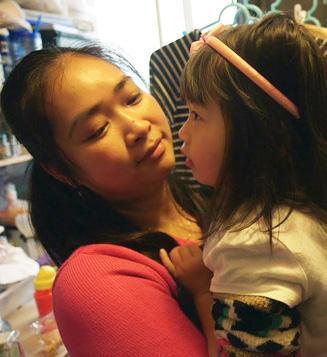

Beloved and divisive SF power broker Rose Pak, who brought ChineseAmerican issues to the forefront, is the star of the documentary “Rally.” While beginning as a journalist and activist, it was her collaborations with Mayors Willie Brown, Gavin Newsom, and Ed Lee where she gained her policy-making influence. We witness her fight for the building of the city’s Central Subway (which just opened in January) as well as her unsuccessful struggle against the closure of the Embarcadero Freeway.

Carmen Madonia has already received rave reviews as Ren, a mid-20s transgender woman who accompanies her family on a vacation in the Canadian-Swiss drama, “Something You Said Last Night,” directed by Luis De Filippis in her debut. While Ren is comfortable as trans and has the support of her parents, she’s still trying to find her place in the world while staking her independence.
Getting lots of local buzz is the new character-driven documentary Home Is a Hotel,” which follows five San Franciscans –with low income or

irreverently titled “Lifting Barrett Browning’s Hem” that she would like to be able to write a sonnet but finds herself unable to.
I can’t help but notice the poem is written in paragraph form rather than in verse, in flowing musicality that defies the relentless driving (robotic?) lines of iambic pentameter.
Nonetheless, she insists: “Instead, my poems are rambling affairs, unruly hounds of questionable origin, refusing to be pent up in a box and following their noses to some rank or delectable matter (sometimes one thing and the same). They are either stupid or free-spirited, but either way, they have no sense of time.”
The poem “Kinship” is a celebration of her finding a kindred spirit in popular culture, Christmas of 1972. Not in heartthrobs Donny, Shaun, or Leif, like the other girls. The author swoons over the most unlikely figure of Don Quixote, spending hours listening to the soundtrack of the hit musical “Man of La Mancha.” She felt seen by him, even through the centuries, the dreamer madman, stuck in the era of chivalry long after the world around him had moved on without him.
Yvonne Zipter’s previous book of poetry was “Kissing the Long Face of the Greyhound.” It is about nature in
dialogue with human nature. She is also the author of “Infraction,” a Russian historical novel with an LGBTQ storyline, as well as two non-fiction books: the very informative “Diamonds are a Dyke’s Best Friend” which contains a summary of the history of women’s sports (particularly softball) and Title IX, and “Ransacking the Closet,” a collection of her syndicated columns that appeared in Outlines, In Step, Philadelphia Gay News, The Weekly News, and The Washington Blade.
In 2020, she was featured in the documentary “A Secret Love” and has contributed to dozens of anthologies. Her poetry collection “The Patience of Metal” was runner-up for the Poetry Society of America’s Melville Cane Award, and was a Lambda Literary Award finalist.
In addition, she co-founded both the National Women’s Music Festival Writers Conference and “Hot Wire: A Journal of Women’s Music and Culture,” the first and for 10 years the only lesbian publication of its kind.
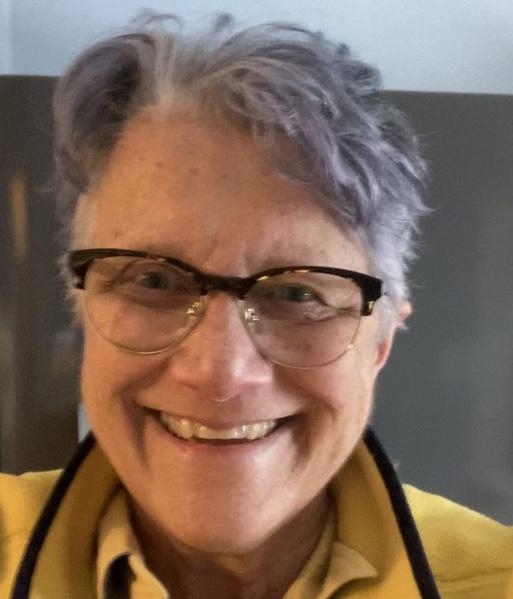

Currently, Zipter is advancing another innovation. She sells her published poems to the public in several poetry (gumball) vending machines around the city of Chicago in what has become a successful and growing endeavor. The proceeds go to the nonprofit organization Arts Alive Chicago to help upkeep local murals.t
“The Wordless Lullaby of Crickets” by Yvonne Zipter, Kelsay Books. $23. www.kelsaybooks.com www.yvonne-zipter.com

who are trying to stay off the streets –as they live in the cramped, noisy, and sometimes vermin-infested Single Room Occupancy (SRO) hotels. They fight to stay housed in the most expensive city in the U.S.
Finally, “Stephen Curry: Underrated” is the opening night fea-
ture, a documentary on the Golden State Warriors NBA superstar with not only electrifying footage on his court activity, but it also explores his academic ambitions and familial bonds. t
www.sffilm.org
18 • Bay area reporter • April 6-12, 2023
<< Books & Farewell 3991-A 17th Street, Market & Castro 415-864-9795
serving the community since 1977. Open Daily! New Adjusted Hours
8am (last seating 9:45pm)
8am
seating 9:45pm)
Proudly
Monday
Tuesday
(last
Wednesday 8am (last seating 9:45pm) Thursday 8am Open 24 Hours Friday Open 24 Hours Saturday Open 24 Hours Sunday 7am (last seating 9:45pm)
Massage>>
TO MEN MASSAGE
a Tall Latin Man. If you're looking, I'm the right guy for you. My rates are $90/hr & $130/90 min. My work hours: 10am-10pm everyday. 415- 5150594 Patrick, call or text. See pics on ebar.com
MEN
I'm
Yvonne Zipter
Left to Right: ‘Peafowl’, ‘Rally’, ‘Something You Said Last Night’, ‘Home Is a Hotel’
Leo Herrera
—Heklina (B.A.R. interview, Sept. 2022)
“I love returning to Iceland. I’m their ‘queen who made it in America.’ ”
Monstrous grief t
by Jim Piechota

Grief for the death of a child manifests in some horrific ways in queer author Gerardo Samano Cordova’s smashing debut, “Monstrilio.” For horror fiction fans, this book is a slow-burning monster story incrementally creeping up on the unsuspecting reader. For general fiction fans, Cordova’s inaugural ordeal is a creative study on the process of mourning and the lengths people will extend themselves in order to preserve a loved one’s spirit, presence, and essence.

The distraught characters at the center of this unique narrative are Magos and Joseph, an upstate New York married couple with one son, Santiago, who was born with a solitary underdeveloped lung and a dire life expectancy. When the boy, who manages to survive eleven years, collapses in his mother’s arms and dies, the family is immedi ately bruised and irreparably broken. In Magos’ voice, Joseph’s reaction is more internal than her own; he can’t let go: “Her husband is not dead, not sleeping, simply slack and raggy,” she observes. “She folds him. First, she folds his fin gers into his palms, prying them from their son’s pajamas.”
In order to continue to love her son, however, Magos decides she must make every effort to revive him both mentally and physically. This is an immensely selfish sentiment, but so is grief, essentially. The act of mourn ing a loved one is an act of adorning respect and remembrance for that person, but also primarily to console and coddle the mourner for the state of their aliveness.
Magos, vulnerable to folk medicine and superstition, becomes desperate to restore her son and resorts to slic ing him open and removing a small piece of his lifeless lung. In a jelly jar, she keeps the sample nearby after leav ing her husband and moving back to her childhood home in Mexico City. There, her mother’s housekeeper tells her if she feeds the “lump”, it would grow. She feeds it broth, the broth is absorbed somehow; then the jar is found shattered on the floor, and something has bitten her in the dark and then becomes attached to the family dog’s hindquarters.
As it becomes obvious her son’s lung has regenerated, it’s also clear that it’s become a small creature, hungry, impulsive, childlike; initially rat-like, then growing more animalistic with body hair, sharp claws, fangs, a hinged jaw, and unusual arm-tail limb struc tures. She names the monster-creature “M” for Monstrilio.
The book plays out in four dramatic, unforgettable overtures, told through the perspectives of Magos, her closest confidante and young surgeon Lena, husband Joseph, and finally, “M” him self. Magos is desperate to continue growing and nurturing M as much as she is excited to finally realize a lifelong career aspiration as a stage actress, and she becomes enabled by the clinical tal ents of unethical physician Lena.
Joseph, meanwhile, has relocated to Manhattan post-divorce, where he has come out and embraced a gay re lationship with Peter, who has recently proposed marriage. While reluctant to reveal his former life and heterosexual marriage, he is even more anxious about introducing M to Peter, as M has grown into a doppelganger of Santiago as well as a stealthily feral, increasingly uncontrollable, ravenous young man on the cusp of adolescence.
The book concludes with a shock ing first-person perspective of M himself, viscerally gnawing through his Earthbound existence, ingesting neighbors, having random sex, hiding a growing new stump of flesh, antici pating his father’s wedding, smoking cigarettes (“very human of me”), and discovering the bliss of emancipation.
Queer themes and more


Suffused with queer themes of identity and belonging, and under

scored with Mexican / North American mysticism, this masterful novel is
struggles with mild osteogenesis imperfecta (OI), a disease that makes his bones brittle. By “mild”, Cordova admits he only broke his legs seven times while growing up. His dental history, however, is a bit more harrowing.
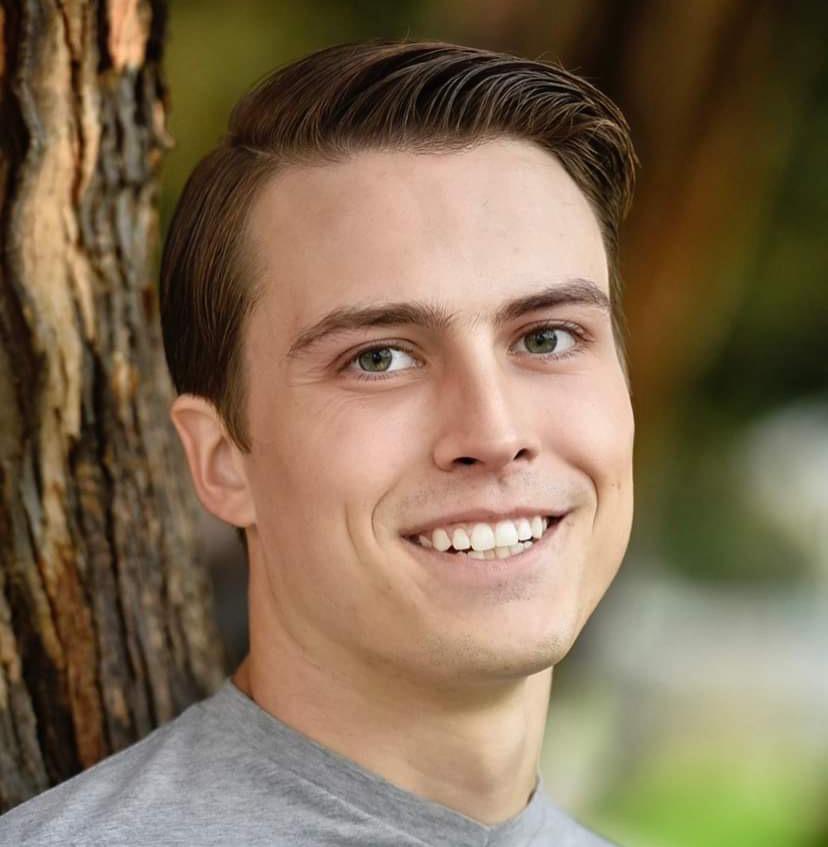
Along with OI, Cordova also contends with dentinogenesis imperfecta, which makes his teeth translucent blue and, sadly, also brittle, which has resulted in him experiencing just about every imaginable dental procedure possible.

Cordova is now in his early 40s and still remains frightened, annoyed, and



April 6-12, 2023 • Bay area reporter • 19
STOP THE HATE! If you have been the victim of a hate crime, please report it. San Francisco District Attorney: Hate Crime Hotline: 628-652-4311 State of California Department of Justice https://oag.ca.gov/hatecrimes The Stop The Hate campaign is made possible with funding from the California State Library (CSL) in partnership with the California Commission on Asian and Pacific Islander American Affairs (CAPIAA). The views expressed in this newspaper and other materials produced by the Bay Area Reporter do not necessarily reflect the official policies of the CSL, CAPIAA or the California government. Learn more capiaa.ca.gov/stop-the-hate. Stop-The-Hate-4x10.indd 1 8/24/22 12:53 PM StevenUnderhill 415 370 7152 • StevenUnderhill.com Professional headshots / profile pics Weddings / Events
Books>>
Gerardo Samano Cordova

Restrictions apply. Ends 4/23/23. Not available in all areas. New Xfinity Internet residential customers only. Offer requires enrollment in both paperless billing and automatic payments with stored bank account. Without enrollment, the monthly service charge automatically increases by $10 (or $5 if enrolling with credit or debit card information). The discount will appear on your bill within 45 days of enrolling in automatic payments and paperless billing. If either automatic payments or paperless billing are subsequently canceled, the $10 monthly discount will be removed automatically. Limited to Connect More 200 Mbps internet. All other installation, taxes & fees extra, and subj. to change during and after promo. After 24 months, or if any service is canceled or downgraded, regular charges apply to internet service and devices. Service limited to a single outlet. May not be combined with other offers. Actual speeds vary and not guaranteed. Ultra-low lag based on median latency of 13 milliseconds or below for Xfinity gigabit Internet customers with xFi Gateway as measured by Xfinity Speed Test. For factors affecting speed visit www.xfinity.com/networkmanagement. Call for restrictions and complete details, or visit xfinity.com. NPA245003-0006 It takes a powerhouse to power a houseful. 99.9% reliable internet on the Xfinity 10G Network $25 a month for 2 years with no annual contract. Requires paperless billing and autopay with stored bank account. Taxes and other charges extra and subject to change. See details below. WiFi equipment included Introducing the next generation 10G network. Only from Xfinity. A network that can effortlessly handle a house full of devices. All at the same time. Which means that you and everyone else can seamlessly watch, work, stream and play whatever you want on all your devices with ultra-low lag. Get ready for a network that can handle the entire house, no matter how full it is. The future starts now. 1-855-307-4896 xfinity.com/10G Visit a store today 145418_NPA245003-0006 W 10G ad 9.75x16 SanFran.indd 1 3/21/23 5:48 PM

 by Cynthia Laird
by Cynthia Laird





 by Matthew S. Bajko
by Matthew S. Bajko










































































 Barbara Sukowa and Ben Kingsley in ‘Dalíland’
Luana Giuliani and Penelope Cruz in ‘L’Immensita’
‘Being Mary Tyler Moore’
‘Pete’
‘Joan Baez: I Am a Noise’ ‘Invisible Beauty’
The Hunky Jesus Contest at Easter in Dolores Park with the Sisters in 2019
Steven Underhill
Barbara Sukowa and Ben Kingsley in ‘Dalíland’
Luana Giuliani and Penelope Cruz in ‘L’Immensita’
‘Being Mary Tyler Moore’
‘Pete’
‘Joan Baez: I Am a Noise’ ‘Invisible Beauty’
The Hunky Jesus Contest at Easter in Dolores Park with the Sisters in 2019
Steven Underhill





 by Victoria A. Brownworth
by Victoria A. Brownworth

































